Targeting Cancer Treatment ASAP
Research by a group of clinicians from across the country led by MSD Hungary and published in late November tries to answer why so many Hungarian patients die with undiagnosed lung cancer. 15
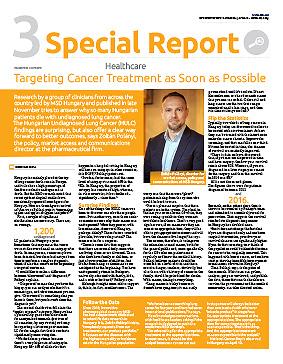
Hungary’s Healthcare Industry is Picking up Speed
Investments in pharma and medtech are badly needed in Europe to keep pace with overseas competitors and prevent a large-scale brain drain. Hungary’s healthcare industry is very much fired up. The latest success story features cuttingedge cancer research. 16
SOCIALITE
Singer-songwriter Lizz Wright on the Power of Music
When she kicks off Jazzfest
Budapest 2023, Lizz Wright will be setting a high standard of musical excellence. She talks with David Holzer about her music, how a performing space shapes it, Budapest, and jazz today. 22
It’s All
About the Teamwork
Industry Still Suffers From High Energy Prices
The Hungarian industrial sector showed weak performance at the beginning of the year, and the latest data confirms that it was not able to bounce back as previously expected. 3
Veronika Spanarova, managing director and country head Hungary at Citi, became the ninth Expat CEO of the Year at our annual awards gala on March 24, and the first from the region 9 -14

Bosch, BME Launch Center for Training Next-gen Engineers
Bosch and the Budapest University of Technology and Economics have inaugurated a state-of-the-art automotive test lab dedicated to the R&D of next-generation electric powertrains. The collaboration aims to provide cuttingedge training for 60-80 uni students per year. 5
NEWS
HUNGARY’S PRACTICAL BUSINESS BI-WEEKLY SINCE 1992 | WWW.BUDAPESTBUSINESSJOURNAL.COM HUF 2,100 | EUR 5 | USD 6 | GBP 4 VOL. 31. NUMBER 7 | APRIL 11 – APRIL 20, 2023
Healthcare SPECIAL REPORT INSIDE THIS ISSUE BUSINESS BUSINESS
EDITOR-IN-CHIEF: Robin Marshall
EDITORIAL CONTRIBUTORS: Balázs Barabás, Zsófia Czifra, Kester Eddy, Bence Gaál, Gergely Herpai, David Holzer, Michael Miller, Gary J. Morrell, Nicholas Pongratz, Bálint Szőnyi.
LISTS: BBJ Research (research@bbj.hu)

NEWS AND PRESS RELEASES: Should be submitted in English to news@bbj.hu
LAYOUT: Zsolt Pataki

PUBLISHER: Business Publishing Services Kft.


CEO: Tamás Botka
ADVERTISING: AMS Services Kft.
CEO: Balázs Román
SALES: sales@bbj.hu
CIRCULATION AND SUBSCRIPTIONS: circulation@bbj.hu
Address: Madách Trade Center 1075 Budapest, Madách Imre út 13-14, Building B, 7th floor. Telephone +36 (1) 398-0344, Fax +36 (1) 398-0345, www.bbj.hu
The Budapest Business Journal, HU ISSN 1216-7304, is published bi-weekly on Friday, registration No. 0109069462. It is distributed by HungaroPress. Reproduction or use without permission of editorial or graphic content
EXPAT CEO AWARD COMES OF AGE
It might sound odd to say for an event that has just celebrated its ninth anniversary, but I came away from our annual Expat CEO of the Year awards gala on March 24 with the powerful feeling that it has come of age.
That was partly down to the audience on the night, who apparently turned up in the mood to celebrate success, network, and, let’s be honest, party. We had about 220 people in the Grand Ballroom of the Corinthia Hotel Budapest, a record for us and pretty close to being as many as you can comfortably accommodate in that space around tables. From my perspective on the stage, there was a great energy coming up from the floor.
But the actual coming of age moment for me was the revelation of the winner’s name, wonderfully handled, I thought by Giacomo Pedranzini, of Kometa, last year’s title winner. That’s not to take anything away from Andreas Szakácsi of Claas Hungária, or Matt Zeller of Novartis. As I said on the night, either one would have been a worthy winner, and I look forward to including more about their personal stories on the pages of this publication in upcoming issues.
It wasn’t even that Veronika Spanarova is a mother and a woman, balancing childbirth, raising a family and building a career. She is, after all, the third female winner, after Melanie Seymour of Blackrock and Taira-Julia Lammi of ABB Kft. It is that she is the first winner from this region. Our previous Expat CEOs of the Year have all hailed from what we might broadly call Western Europe: Spain, Germany, Finland, the United Kingdom, the Netherlands, and Italy. It is true that one of our German winners was also half-Brazilian, but we have never had anyone from Central Europe before.
are many outstanding Magyar business leaders, and quite a few were in the ballroom with us. We founded the award to recognize the contributions of the expat CEO community in developing Hungary’s economy and its work culture by promoting ideas like diversity and inclusivity. Now we have a Czech woman working for an American financial institution based in Budapest.
It would be ridiculous to suggest Central and Eastern Europe has arrived; apart from anything else, it is pretty hard for a geographical region to move anywhere, the shifting of continental plates aside. But the expectation prevalent in the late 1980s and 1990s that a Western brand must bring in one of its own to head a company here has well and truly been consigned to the trashcan.
By the way, I was asked at the afterparty what my favorite part of the evening is. There are many highlights, of course, not least hearing the winner’s name announced, as I am not involved in the decision, and it is as much news to me as it is to them and the rest of the audience. But my admittedly quirky answer is that my favorite part happens right at the beginning, and it is seen by next to no one other than me up on the stage. It is the moment the Corinthia team opens the doors of the ballroom in unison, the sound of the chatter and the clinking of glasses sweeps in from the foyer, and we invite you in. Nothing is known; all is to play for, and anticipation is at its height. We’ll do it all over again next year when, almost unbelievably, we present the award for the 10th time. It’s been quite the decade.
VISIT US ONLINE: WWW.BBJ.HU

Why Support the BBJ?
• Independence. The BBJ’s journalism is dedicated to reporting fact, not politics, and isn’t reliant on advertising from the government of the day, whoever that might be.
• Community Building. Whether it is the Budapest Business Journal itself, the Expat CEO award, the Expat CEO gala, the Top Expat CEOs in Hungary publication, or the new Expat CEO Boardroom meeting, we are serious about doing our part to bind this community together.
• Value Creation. We have a nearly 30-year history of supporting the development of diversity and sustainability in Hungary’s economy. The fact that we have been a trusted business voice for so long, indeed we were the first English-language publication when we launched back on November 9, 1992, itself has value.


• Crisis Management. We have all lived through a once-in-a-century pandemic. But we also face an existential threat through climate change and operate in a period where disruptive technologies offer threats and opportunities. Now, more than ever, factual business reporting is vital to good decision-making.
For more information visit budapestbusinessjournal.com
The award has never been intended to downplay the role of Hungarian CEOs. As I said from the stage, there

THEN & NOW
A six-row Agrion planter sows sunflower seeds using around 75 horsepower on a 150-hectare field on the outskirts of Orosháza (about 200 km southeast of Budapest by road). In the black and white photo from the Fortepan public archive, the same action is being performed with the assistance of one horsepower in 1950.

 Robin Marshall Editor-in-chief
Robin Marshall Editor-in-chief
2 | 1 News www.bbj.hu Budapest Business Journal | April 11 – April 20, 2023
in
manner is prohibited. ©2017
MEDIA SERVICES LLC with all rights reserved.
potential.
any
BUSINESS
What We Stand For: The Budapest Business Journal aspires to be the most trusted newspaper in Hungary. We believe that managers should work on behalf of their shareholders. We believe that among the most important contributions a government can make to society is improving the business and investment climate so that its citizens may realize their full
IMPRESSUM BBJ-PARTNERS THE EDITOR SAYS
Photo by MTI / Rosta Tibor
Photo by Fortepan / Magyar Rendőr
Industry Still Suffering from High Energy Prices
The Hungarian industrial sector showed weak performance at the beginning of the year, and the latest data confirms that it was not able to bounce back as previously expected.
In February, the volume of industrial production declined by 4.6% on a yearon-year basis. According to the first estimate by the Central Statistical Office (KSH), the working day-adjusted index equals the non-adjusted one. When it comes to seasonally and working-day adjusted data, industrial output was 0.3% higher than in January 2023.
The majority of manufacturing subsections contributed to the production decline. Of the subsections having the most significant weight, the manufacture of electrical equipment grew at the highest rate, but the manufacture of transport equipment increased, too. At the same time, the volume of production fell in the manufacture of computer, electronic and optical products, as well as in that of food, beverages and tobacco products.
Although industrial output in February – according to seasonally and workingday adjusted indices – was
0.3% above
the level of the previous month, in the first two months of the year, production was 2.4% lower than in the same period of 2022.
Analysts were disappointed by the fresh data. Gergely Suppan, head analyst at Magyar Bankholding, said the data was way below expectations. Although there was some increase on a monthon-month basis, for the time being, the rebound expected after the January downturn has not materialized. That still indicates that the production of some sectors may have been restrained due to high energy prices, Suppan says.
The stagnation of industrial production experienced from the beginning of the fourth quarter of 2022 was caused mainly by the reduction or stoppage of
Industrial Production in Hungary, 2001-2023 (January-February) Producer volume index, compared to the same period of the previous year.
production in energy-intensive sectors as a result of the explosion of energy prices. November’s problems related to oil refining also worsened the industrial performance of the industry, he believes. According to him, in some sectors, especially the food industry, weakening internal demand may lead to more subdued production. Due to the lower energy consumption (partly caused by the mild winter weather and partly by the forced energy saving), industrial production may also have been dragged down by the decline in the production of the energy-producing sectors.
Historical Peak
Suppan pointed out that, by October 2020, industrial production had fully recovered from the crisis caused by the pandemic; however, further notable growth was halted by the lack of microchips, so industrial production fluctuated close to the preepidemic level, slightly exceeding it, from which it gained a definite momentum from the beginning of last year. In September, it reached a new historical peak and then fell again. Compared to the 2015 average, industrial production increased by 20.4%. It exceeded the 2010 average production level by 47.2%.
The head analyst recalls that production volume expanded
significantly in vehicle manufacturing and electrical equipment production. In October 2020, the output of automakers had already exceeded the pre-pandemic level, but was, on average, 20% behind the year before, reducing the volume of industrial production by about five or six percentage points, Suppan says. He adds that new orders in the vehicle industry fell by 1%, while its order book in January exceeded the level of a year ago by 5.6%.
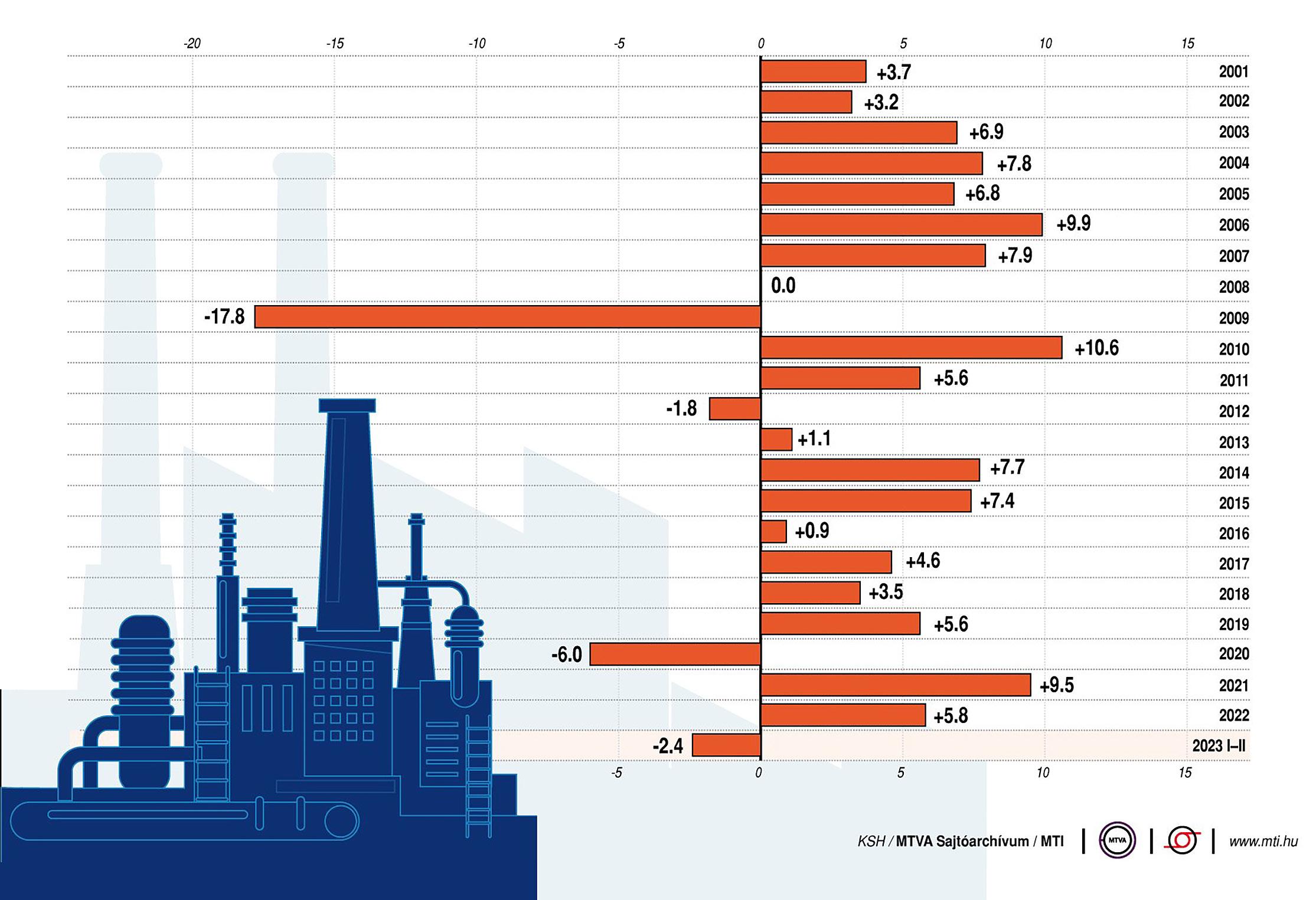
In the last two years, due to limited supply capacities, auto manufacturers have mainly fulfilled orders for more expensive models with higher profit margins; however, the sub-sector has shown significant improvement since the second half of last year, and some players have predicted the full recovery of supply chains, due to which a new peak was reached in December last year in domestic vehicle production.
The war in Ukraine and the energy crisis significantly worsened the prospects last year. Still, in recent months, they have already shown a significant improvement, as there is no need to fear a power shortage for the time being. European economies have avoided an acute energy crisis, and energy prices
have fallen significantly to the levels of the end of last summer, he explained.
Domestic industrial order books continue to show growth, exceeding the level of a year ago by about 3.4%, so the easement of supplier problems and energy prices may result in further recovery, Suppan said of the sector’s prospects.
The performance of the sector has now declined for the second consecutive month on an annual basis, Gábor Regős, head economist at Makronóm Intézet, confirms. According to him, several factors may have played a role in the decline. The energy crisis makes it impossible for many, primarily smaller businesses, to operate, which in turn reduces the competitiveness of Hungarian industry as a whole, he says.
“On the other hand, runaway inflation can cause problems, especially in the case of the food industry: in addition to high prices, demand moderates, so this reduces the sector’s production. This can be exacerbated by efficiency problems,” Regős said.
Based on today’s data, it is likely that industry will not be able to contribute to the economic expansion in the first quarter, so that GDP will decrease on an annual basis. Looking at the year as a whole, a significant increase in industrial output will be necessary to avoid a recession, Regős warns.
www.bbj.hu Budapest Business Journal | April 11 – April 20, 2023
1News • macroscope
ZSÓFIA CZIFRA
Source:
Hotco 2023 Attracts Around 300 Attendees to Vienna
Hotco 2023, the leading hotel investment conference for the Central and Eastern European region and beyond, attracted almost 300 investors, developers, operators, designers, bankers, owners, brands, consultants and entrepreneurs from three continents to the Andaz Vienna am Belvedere in the Austrian capital, a new host city, on March 27-28.
The event focused on the financing, development and asset management of hospitality projects. In addition to this, topics included news and analysis and success stories from CEE hotel investors, owners and brands.

“Hotco 2023 event was a great success; it exceeded every expectation and proved its strong position in the hospitality industry,” said Horwath HTL Hungary, organizers of the annual event.
The conference consisted of 12
panel sessions
in addition to networking events where 56 speakers shared their professional insights and stories. Susanne KrausWinkler, Austria’s State Secretary for Tourism, emphasized the resilience of the industry and her positive outlook for the future. Besides the panels, the organizers also provided a large number of networking opportunities.
In the panel sessions, participants were given insights into selected acquisitions
Real Estate Matters
A biweekly look at real estate issues in Hungary and the region
increasing the sustainability of hotel projects is of the utmost importance, as this can reduce costs and assets that comply with ESG criteria are increasingly more sought after by investors. According to Ulrike RabmerKoller, CEO of Rabmer Group, green technology will play an important role and create a win-win situation.
David Jenkins, vice president of business development at Radisson Hotel Group, highlighted how two of its new brands, Radisson Collection and Radisson Individuals, found their respective markets during the pandemic and demand has been growing ever since. All the global players on stage underlined the strong progress they have made in strengthening their brands across Europe as a whole.
straight from the sources. The first panel looked at the acquisition of Vienna House by Wyndham Hotels & Resorts.
The audience learnt how Vienna House changed from an idea on a piece of paper to a successful European brand to it becoming a global player through its new owners.
Professionals discussed questions related to hotel project financing and sustainability. International hotel operators are seeking new locations, while developers, investors and banks are still cautious about new construction projects, due to high construction costs and the limited availability of financing. available.
Sustainability is the Future
A number of panel sessions highlighted the importance of ESG and sustainability. Speakers agreed that
There was also an official announcement by Péter Kerek, deputy managing director for strategy at Accent Hotels, and Silvija Lovreta, senior director for South Eastern Europe international hotel development at Marriott International, of the proposed opening of the first Four Points by Sheraton hotel in Budapest.
Hotco 2023 concluded with a cautiously optimistic general sentiment about the upcoming years.
“Despite economic headwinds and geopolitical turmoil in Eastern Europe, the hotel industry has shown remarkable resilience in the CEE region and still offers untapped opportunities. Panelists and attendees agreed that hotel investments are an excellent hedge against inflation, often outperforming residential and office investments,” concluded Marius Gomola, managing director of Horwath HTL and the founder Hotco.
5 Leaders Appeal for EC Help Over Ukrainian Grain Roundup Crisis
The Hungarian Parliament voted to accept Finland into the North Atlantic Treaty Organization on March 27, with a tally of 182 for, six against, and no abstentions. While Hungary’s choice to support the bid came after that of fellow holdout Turkey, the ratification in Budapest took place before lawmakers in Ankara officially accepted Finland’s accession on March 30.
historically-neutral Nordic country had decided to join following Russian President Vladimir Putin’s invasion of Ukraine last year. Finnish Prime Minister Sanna Marin welcomed the ratification of her nation’s bid before her party lost its majority in the Finnish parliamentary elections on April 2. Although Finland’s bid had occurred concurrently with that of neighboring Sweden, Turkey and its ally Hungary continue to withhold their approval in the latter case, despite claims from members of the Hungarian government purporting to be in favor of the accession. In an interview with Turkish state television on April 3, President Katalin Novák said she backed Sweden’s accession, believing it would strengthen the alliance.
politicians over democratic standards and human rights abuses in their country.
Turkey also believes that Sweden harbors members of what it considers terrorist groups, demanding their extradition as a step toward ratifying Swedish membership, some of which Swedish courts have impeded. Ultimately, Novák said that “we should now put these issues aside and say that now, in this very difficult and demanding situation, we have more reasons to accept Sweden into NATO than to refuse it,” she said.
Flood of Grain
Finland officially joined NATO on April 4, expanding the length of the alliance’s border with Russia by some 1,300 kilometers (810 miles) after the
However, she also acknowledged the concerns of MPs from the governing Fidesz party, considering “unbased, biased statements” by Swedish representatives that, she said, called Hungarian democracy “into question.” Turkish lawmakers have likewise been irked by comments from Swedish
Meanwhile, the leaders of Bulgaria, Hungary, Poland, Romania and Slovakia addressed a joint letter to European Commission President Ursula von der Leyen, asking her to take steps to manage the unsustainable situation caused by the flood of grain imports from Ukraine, according to a statement from the Hungarian Ministry of Agriculture on April 1.
In the letter, the five leaders requested that von der Leyen raise the allocation of resources for affected farmers, weigh
EU grain purchases for humanitarian purposes, and roll back exemptions from customs duties and import quotas. All have a direct land border with Ukraine, except for Bulgaria.
The European Union’s decision to waive customs duties on Ukrainian farm products to expedite their export resulted in an “unprecedented” volume of grain and oilseed imports into neighboring countries, according to Hungarian Minister of Agriculture István Nagy.
Earlier, the minister had ordered strict quality and food chain safety checks for grain flooding into Hungary from Ukraine. A subsequent investigation coordinated by the National Food Chain Safety Office (Nébih) over the past few weeks revealed that corn imported from Ukraine had been contaminated with mycotoxins in three cases. At the same time, three samples also indicated positive results for GMOs. The agriculture ministry also reported that more than 29 tonnes of corn from Ukraine inspected in Békés county was found to be contaminated with chaffed corn seeds and was subsequently slated for destruction.
4 | 1 News www.bbj.hu Budapest Business Journal | April 11 – April 20, 2023
GARY J. MORRELL
Ukraine
NICHOLAS PONGRATZ
The global brands panel discussion at Hotco 2023.
2 Business
Bosch, BME Launch Center for Training Next-gen Engineers
Bosch and the Budapest University of Technology and Economics (BME) inaugurated their Competence Center for Innovative Vehicle Technologies, a stateof-the-art automotive test lab dedicated to the research and development of nextgeneration electric powertrains, on March 29. The collaboration aims to provide cuttingedge training for 60-80 university students per year, developing engineers capable of solving real-world challenges and creating future technologies. GERGELY
The Bosch Group and BME have been working together for almost 15 years, with the competence center representing the latest milestone in that ongoing collaboration. It has the potential to impact the world of electromobility significantly, bringing together the resources, expertise, and vision of Bosch and BME to create a space for groundbreaking research, innovation, and education, the partners say.
The collaboration will not only benefit them but also help shape the future of the automotive industry as a whole, they say.
“Bosch’s long-term strategy is to strengthen the link between higher education, industrial research, and development by building a unique innovation ecosystem,” András Kemler, managing director of technical areas and location manager at Robert Bosch Kft, said at the launch.
“We want to actively contribute to the training of the new generation of
engineers so that together, we can make even more effective progress in solving the challenges of the future.”
The Competence Center for Innovative Vehicle Technologies will concentrate on developing powertrains for electric vehicles. This focus is in response to the growing global demand for more efficient, environmentally friendly transportation solutions. As the world faces increasing environmental concerns and the urgent need for sustainable solutions, the center’s focus on electric powertrain technology becomes even more critical.
Solving Real Challenges
Máté Zöldy, head of the BME MSc Vehicle Engineering Committee, emphasized the importance of active and multilevel cooperation with leading industrial companies in training engineers capable of solving real challenges.
“Through industrial research assignments, academics engage with students and engineers in answering research questions, and first-hand experience is transferred through education,” he said.
“The aim is to improve the efficiency of electric powertrains, increase range, and make the available battery capacity and energy consumption more predictable, making charging needs and getting to the destination more predictable,” Zöldy added.
As part of the collaboration between Bosch and BME, a new 350 sqm office space has been built within the competence center. This state-of-the-art facility was designed in line with the “New Way of Working” concept introduced by Bosch. It features an open office layout, what they
call “house-in-house” meeting rooms, a soundproof library room for contemplation, and a “work café” that functions as a community, dining, and collaboration space.
Deputy State Secretary for Innovation László Bódis of the Ministry of Culture and Innovation praised the initiative, saying the collaborative space creates “an inspiring working environment that enhances the efficiency of individual and group work and supports collaboration.”
The center will develop a classically styled test car incorporating the latest electric powertrain technologies as a unique R&D project. The endeavor represents a bold step forward in the quest for more efficient, eco-friendly transportation solutions. Bosch’s Kemler explained the significance of the project.
Evaluate and Refine
“The components of the electric powertrain will be interchangeable in a modular way, allowing for accurate testing and optimization of the powertrain’s operation, thermal characteristics, and range. This innovative approach will allow us to evaluate and refine various electrical components more accurately, ultimately leading to better overall performance and efficiency in electric vehicles,” he explained.
Digital data collection will take place not only on the chassis dynamometer at the center but also under real conditions on the ZalaZone test track and even at one of the world’s most famous international vintage motor racing events. This real-world testing is essential in ensuring the developed technologies can be effectively integrated into future electric vehicles.
The collaboration between Bosch and BME aims to provide students with the knowledge, skills, and experience necessary to tackle real-world challenges and contribute to developing innovative vehicle technologies. Zöldy highlighted its impact.


“Active and multi-level cooperation with leading industrial companies is one of the keys to training engineers who can solve real challenges. The Competence Center for Innovative Vehicle Technologies will help cultivate a new generation of skilled engineers ready to shape the future of transportation,” he predicted. “Active and multi-level cooperation with leading industrial companies is one of the keys to training engineers who can solve real challenges.”
As the world continues to face environmental challenges and the demand for greener transportation solutions grows, industry players believe that centers like this will play a vital role in shaping the future of electromobility. By fostering close cooperation between industry leaders and academia, Bosch and BME say they are helping to ensure that the next generation of engineers is well-equipped to meet the challenges and opportunities of a rapidly evolving transportation landscape.
As the world grapples with the pressing need for environmentally friendly solutions, collaborations like this one will prove increasingly important in driving innovation and shaping the future of the automotive industry.
www.bbj.hu Budapest Business Journal | April 11 – April 20, 2023
HERPAI
The official launch of the Competence Center for Innovative Vehicle Technologies.
The center will develop a classically styled test car with the latest electric powertrain technologies as an R&D project.
Budapest LNG Summit 2023: The Future of Gas
Industry
in
for the fourth
April
The fourth Budapest LNG Summit, organized by White Paper Consulting, had as its patron Hungary’s Minister for Foreign Affairs and Trade, Péter Szijjártó. The event saw industry leaders and policymakers discuss Europe’s current and future gas and LNG markets.

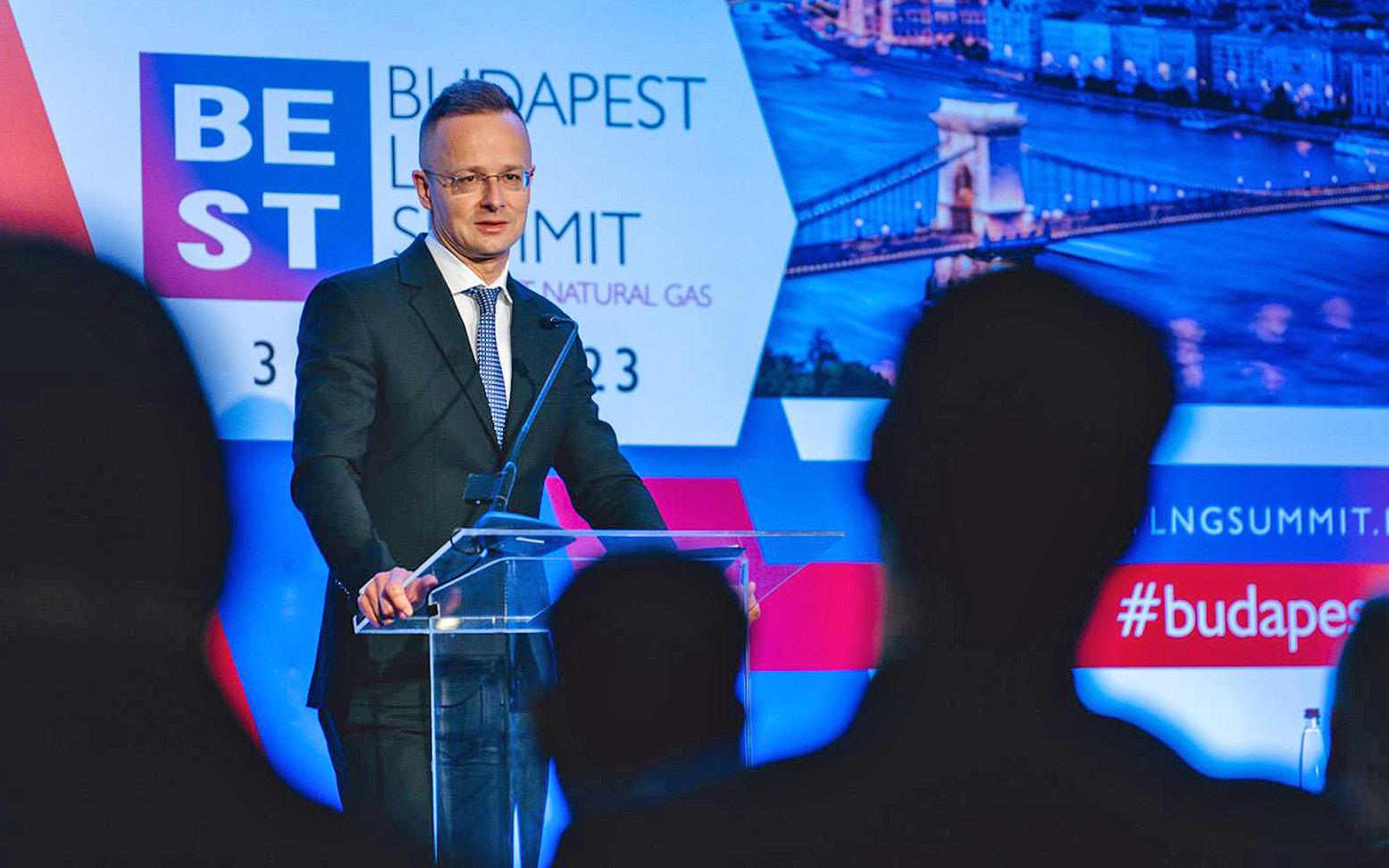
In his opening address, Szijjártó warned: “Last year, it became obvious that the security of the European energy system was an illusion.” He highlighted a 50 billion cubic meter (bcm) shortage looming for the
2023-24 winter
heating season.
He stressed that Hungary supports efforts to diversify and find new sources of gas, but not at the expense of existing relationships.
Szijjártó also noted the need for EU funding.
“In order to diversify, the support of the EU will be needed as well to develop the infrastructure accordingly,” he told the audience.
Gergely Szabó, regional chairman of MET Central Europe, highlighted the importance of LNG in the energy mix, stating, “LNG equals independence.” Imran Mohammed, a gas transportation and storage analyst from the Gas Exporting Countries Forum, anticipated a rebound in global gas consumption in 2023, accompanied by an increase in global gas production and trade.
László Fritsch, CEO of MVM CEEnergy, echoed these sentiments, foreseeing LNG as a crucial player in the market for the next 10-15 years, saying, “LNG is the star and will be the star for the upcoming years.”
Critical Infrastructure
Meanwhile, Teodora Georgieva, executive officer and board member at Interconnector Greece Bulgaria (ICGB),
praised the construction of the ICGB pipeline as a critical infrastructure project for energy security and independence, informing that “by 2024, transmission capacity will increase to up to five bcm per year.”
Andrzej Kensbok, vice president of GAZ-System, provided insights into Poland’s recent LNG capacity developments. He said that Baltic Pipe (a natural gas pipeline between Europipe II, which traverses the North Sea between Norway and Germany and Poland) “has proven to be not only successful from day one of the operation but also instrumental in supplying gas throughout last winter.”
Ion Sterian, director general of Transgaz, discussed Romania’s current and planned gas interconnectors, mentioning that his organization is “finalizing negotiations” with Serbia. He added, “At the end of
2021,
we finalized construction to be able to receive gas from the Turkish corridor, which has six terminals.”
Gábor Szokodi, director of trading and business development at FGSZ, emphasized the importance of investing
in future gas projects, saying that “the focus should be on investments in the security of supply.”
Hungarian Deputy State Secretary for Energy Security, Dóra Zombori, expressed the government’s perspective on the country’s security supply, stating, “Our goal is to get gas from all directions,” while also highlighting the race for infrastructure development.
Despite the concerns about the upcoming heating season, Franck Neel, member of the Executive Board at Romanian integrated oil company OMV Petrom S.A., controlled by Austria’s OMV, expressed optimism about new measures in energy efficiency.
“I think we need to be worried about demand and supply, but the new measures in areas such as energy efficiency are certainly positive signs going forward.”
LNG Gas Storage
Olga Bielkova, director of government and international affairs at GTSOU, the Ukrainian gas transmitter, highlighted that LNG is “an important addition to Ukraine,” not least for domestic production but also in the area of gas storage for Europe. Ukraine’s Deputy Energy Minister, Mykola Kolisnyk,
praised the continent’s actions in recent months to cut consumption while also emphasizing Ukraine’s competitive gas storage facilities.
Esther Ang, head of LNG at MET International, the Swiss-based energy firm with Hungarian roots, highlighted the importance of upstream investments. “Is there going to be enough LNG? Is there enough investment to allow such supplies?” she asked.
She also spoke about the importance of long-term contracts in securing LNG supplies. “If timelines are not meeting each other, it makes it very difficult to secure such a supply, even if there is the willingness on both sides.”
Attila Ságodi, a partner at law firm Dentons Europe Consulting, pointed out the necessity of financing and cooperation in the sector. “We have to make the investments and the decision today to be prepared for tomorrow,” he warned.
Thomas de Boer, vice president of Shell’s Commercial Road Transport (Sectors and Decarbonization), shared insights on the potential of LNG in reducing carbon emissions for the commercial road transport sector.
“Shell customers fueling with LNG already benefit from up to 18%
GHG [greenhouse gas] reduction on a well-to-wheel basis, alongside lower particulates, nitrogen oxides, sulfur emissions, and quieter performing engines, compared to conventional diesel.”
The conference concluded with the signing of a memorandum of understanding initiated by Shell Hungary and multiple energy and transport stakeholders to accelerate the energy transition and reduce carbon emissions in the commercial road transport sector. They said the collaborative effort demonstrates the commitment of industry leaders and policymakers in addressing the challenges and opportunities in the European gas and LNG markets as they work towards a more secure and sustainable energy future.
6 | 2 Business www.bbj.hu Budapest Business Journal | April 11 – April 20, 2023
leaders and policymakers convened
Budapest
time on
3 to discuss the European gas and LNG landscape ahead of what many predict will be a challenging supply-strained winter season.
GERGELY HERPAI
Shaping the European Hydrogen Landscape
One day after the 4th LNG Summit in the Hungarian capital, industry leaders and policymakers convened at the 2nd Budapest Hydrogen Summit on April 4 to discuss the challenges and opportunities in this emerging field. With a focus on regulatory frameworks, investment conditions, and infrastructure, participants emphasized the importance of flexibility and collaboration in driving the transition toward cleaner energy solutions.
During his opening remarks, Hungary’s Deputy State Secretary for Energy and Climate Viktor Horváth of the Ministry of Energy, declared, “The most important goal for ourselves for the coming year is to set up the basis for the hydrogen economy.”
In his keynote speech, Jorgo Chatzimarkakis, CEO of Hydrogen Europe, discussed the recent progress in regulatory and political spheres and called for further steps to support hydrogen’s role in Europe’s green transition.
In the first panel discussion, energy leaders such as Yelda Guven, policy VP at ExxonMobil Low Carbon Solutions, urged European policymakers to “focus on objectives, reducing emissions for societies, rather than the color of hydrogen.” That was a reference to “green” hydrogen, produced using

carbon-neutral energy, or “grey” and “blue” hydrogen, which use more polluting energy in the process.
Najla Al Jamali, alternative energy chief executive at OQ Oman, underlined the importance of green hydrogen in the energy transition but acknowledged that “it is a journey” in which other colors of hydrogen have a role to play.
Ralph Bahke, Gas Infrastructure Europe (GIE) hydrogen area sponsor and managing director at ONTRAS, stated, “The only thing missing is a regulatory framework and stable investment conditions.”
Ákos Hegedüs, managing director at Linde Gas Hungary, said that Hungary currently only has grey hydrogen production but believed there would be a mix in the future. Szabolcs I. Ferencz, chairman-CEO of FGSZ (the owner and operator of the Hungarian high-pressure natural gas pipeline system, servicing gas distribution companies, power plants, and large industrial consumers), discussed the underperformance of the hydrogen market.
“Europe, as we see, is still better at the production of regulations than actually producing hydrogen,” he told the audience.
Legal Framework
Ion Sterian, director general at Transgaz Romania, emphasized the need for a transparent background against which to work, stating, “We need a legal frame; without legislation, we cannot do anything.”
A panel on hydrogen mobility saw experts discuss the prospects for utilizing hydrogen in a decarbonized transport sector. Gáspár Balázs, Alstom Hungary’s CEO, highlighted the significant expected increase in Hungary’s energy consumption and the potential role of hydrogen transportation.
Richárd László, country director of Toyota Central Europe Hungary,
said, “We are ambassadors for this technology,” referring to Toyota’s commitment to hybrid technologies. In the conference’s final panel discussions, experts addressed current and future regulations, financing, and the investment landscape. Jan Jakob Peelen, partner and co-head of the Europe Energy sector group at global law firm Dentons, noted that many electrolyzer projects are subsidized, making them more feasible.
for developing a hydrogen economy based on the Greek experience.
“It is important for us to help the local community to adapt to the new realities, and hydrogen can be a good driver for this change.”
Tudor Constantinescu, principal adviser at the European Commission’s Directorate-General for Energy, highlighted the EU’s progress in establishing a hydrogen market, saying, “We have moved from kilowatts to megawatts.” He also mentioned the fragmented financing sphere and the challenges posed by external factors like the invasion of Ukraine and the REPowerEU package.
Pál Ságvári, vice president of the Hungarian Energy and Public Utilities Regulatory Authority (Mekh), said that the current regulation is too biased toward renewables-produced hydrogen and urged more flexibility to build local competitiveness. He added that a regulated Hungarian hydrogen market could be established by the middle of next year.
Participants at the summit also discussed the importance of collaboration and innovation in driving the hydrogen economy forward. Oleksandr Diachenko, vice president of the Ukrainian Hydrogen Council, emphasized the role of repowering Ukraine in the broader context of repowering Europe.
Local Adaptation
Constantinos Papalucas, coordinator of the Greek National Hydrogen Committee and managing director of EastMed Energy Hub, presented a roadmap
Péter Horváth, CEO of Met Group’s Dunamenti Power Plant here in Hungary, presented his analysis using the Leibereich clean hydrogen ladder and urged the industry to “start small and scale up.” He warned that imposing too many hydrogen industry restrictions may discourage private investors.
Andreas Noky, project manager at Clean Hydrogen Messer SE & Co. KGaA, discussed the four pillars of Hungary’s national hydrogen strategy and Messer’s support in delivering the green transition in public transport.
“When it comes to transportation, we are in a very good position to support the transition,” he said, emphasizing the ultimate prize: “Keep in mind, the goal must be green. Full stop.”
In the concluding discussions, participants explored the role of the widely reported European Hydrogen Bank in scaling up the EU hydrogen economy. They acknowledged the importance of establishing a robust financial framework to support the growth and expansion of the hydrogen sector across Europe.
2 Business | 7 www.bbj.hu Budapest Business Journal | April 11 – April 20, 2023
GERGELY HERPAI
“Europe, as we see, is still better at the production of regulations than actually producing hydrogen.”
Panel discussion on “How to transport and store hydrogen? Assessing the potentials of repurposing the gas infrastructure.”
Is a Pakistani Sovereign Default Looming Ahead on the Horizon?
Finance Matters
There are quite a few countries on the critical list; this article deals with Pakistan, a country of 230 million people, the fifth most populous in the world and discusses the probability of default and implosion in Pakistan and its possible impact.
Pakistani bond yields are at distressed levels. Hard currency reserves are dwindling rapidly (at about three weeks of imports). GDP has been stagnant over the past five years. The country must pay down USD 22 billion of debt in the coming year and USD 80 bln over the coming three years.
The rupee has devalued by 60% over the past year, while inflation is in the range of
23-46%,
depending on whose measures are used. Rating agencies are consistently downgrading Pakistan (Fitch just downgraded to “CCC” and says, “Default is a real possibility.”)
Droughts and heat waves are becoming more frequent. Record rains recently caused flooding to a third of the country, pushing another eight-to-nine million people below the poverty line. Food shortages and price surges have resulted in mobs looting restaurants and trucks carrying foodstuffs.
The political situation is explosive, with a populist outsider, Imran Khan, likely to win elections this summer, pitted against the establishment and military, whose support he would need to govern.
Nursing Wounds
His last stint as prime minister was characterized by bouts of antiAmericanism and a breakdown of relations with the military. He has loudly voiced concerns that the upcoming elections are rigged against him and that he may not accept
the results. He blames the current prime minister for an attempt on his life and is still nursing a leg wound.
Pakistan has some USD 126 bln
of external debt. Should a default occur, the probability of an IMF rescue plan coming together, as was the case with Sri Lanka, is less than assured for several reasons:
• No matter who wins the elections, there will be cries of political illegitimacy, making IMF negotiations more difficult, especially when pushing through hard political reforms, like energy and tax increases. Pakistan has a tradition of economy-crippling strikes.
• The IMF has asked Pakistan to approach creditors (for example, China) and obtain new credits, showing hesitation to step in as a lender of last resort.
• Relaunching growth in Pakistan is hampered by a lamentable investment in human capital. Pakistan ranks 141 out of 174 countries on the Human Capital Development Index. There is a higher than 45% illiteracy rate. As of 2019, only 62% of children of primary school age were enrolled in school. A massive brain drain is robbing the country of some of its best talent.
• After 22 lending programs to Pakistan, and allegations of funding a terrorist state, the IMF has reason to be reticent in supporting Pakistan. A recent IMF

mission to Pakistan in February failed to result in an agreement on unlocking a mere USD 1.1 bln from an existing 2019 IMF facility, partly because Pakistan insists on its regressive tax policies (raising sales tax rather than introducing a property tax).
Most Vulnerable
The likelihood of implosion is augmented by Pakistan being among the most vulnerable countries in the world to climate change while lacking the capital or institutions to deal with it. Further climate shocks might accelerate the downward spiral.
Should there be a default, without an IMF rescue package, an economic death spiral could result in a failed state. Even with a rescue package, the downward spiral may be too strong to overcome. Default would create a recession. A rise in energy prices and taxes, a likely condition of an IMF package, would add to the severity of the recession. Devaluation would lead to higher inflation. A tightening of monetary policy to defend the rupee could result in a wave of bankruptcies. The man in the street is likely to suffer even more than now.
A default could have a ripple effect on Pakistan’s creditors, most notably China. A default could create a perception of higher risk in lending to emerging markets, contributing to rising interest rates and difficulty in financing government bonds across all emerging markets.
Perhaps the most terrifying prospect is that in the case of civil disobedience or civil war, the fate of Pakistan’s nuclear facilities could be up for grabs. Pakistan may have the privilege of being the least stable of all countries possessing nuclear weapons.
Let me finish on a positive note. As the saying goes, hope for the best, and prepare for the worst. There are a few optimists in Pakistan. Goldman Sachs, for example, forecasted as recently as December 2022 that Pakistan would not default and that by
2075, it would be the sixth largest economy in the world, provided “appropriate policies and institutions” are in place; in my opinion, that is a strong assumption in the case of Pakistan.
Les Nemethy is CEO of EuroPhoenix Financial Advisers Ltd. (www.europhoenix.com), a Central European corporate finance firm. He is a former World Banker, author of Business Exit Planning (www. businessexitplanningbook.com), and a previous president of the American Chamber of Commerce in Hungary.
8 | 2 Business www.bbj.hu Budapest Business Journal | April 11 – April 20, 2023
With the attention of economists and financial analysts absorbed by the banking crisis, other clouds on the horizon are being neglected. Columnist Les Nemethy sees sovereign default in emerging markets as one of those risks.
in Hungary
the region
A biweekly look at financial issues
and
Will the IMF be able or willing to provide shelter should Pakistan default? Photo by Bumble Dee / Shutterstock.com
Veronika Spanarova Triumphs at 2023 Expat CEO of the Year Gala
Shortly after the Hipa CEO’s speech, warm appetizers were served, including vegan, gluten-free, and lactose-free dishes for those with special dietary needs. The guests also took part in an interactive quiz with questions related to Hungary’s history, culture, and business life.
This year, the Budapest Business Journal introduced a new prize, the Community Award, presented for the first time at the Expat CEO of the Year Gala. The award recognizes a company leader or head of a foundation or business organization for their efforts in diversity, inclusivity, disability, or sustainability.

Marshall noted that “the very first winner of the BBJ Community Award was shortlisted as Diversity Champion of the Year by the London-based European Diversity Awards in 2022, becoming the first nominee from Hungary. She was ranked among the top five CEOs in Hungary based on LinkedIn engagement rate in 2022. Forbes Hungary has ranked her among the most influential women in business since 2020. She was among the first to receive the ‘Leading Woman for a Sustainable Future’ award from the Hungarian Business Council for Sustainable Development in 2017.”
Debut Winner
The exclusive, invitation-only blacktie event was held for the ninth time. A prestigious crowd of business leaders, their other halves, diplomats, and decision-makers gathered at the hotel to witness the award ceremony.
The BBJ Expat CEO Award is given to the foreign business head working and living in Hungary who is considered to have contributed most to the development of the Hungarian economy and its international recognition in the previous year. The first gala was held in 2015. “The BBJ is Hungary’s only Englishlanguage economic bi-weekly and has always played an important role in providing information for expat CEOs working and living in Hungary. That is why we decided to found an award to recognize their efforts annually,” said Balázs Román, the CEO of the Budapest Business Journal
The Expat CEO of the Year is picked by a professional jury of five just 30 minutes before the gala starts. The professional expertise of the independent jury members underpins the high quality of the award.
Expert Jury
The panel this year consisted of Írisz Lippai-Nagy, CEO of the American Chamber of Commerce in Hungary, who has been involved since the beginning, István Joó, CEO of the Hungarian Investment Promotion Agency, the official event partner for the award, German-Hungarian Chamber of Commerce and Industry president András Sávos and BBJ CEO Balázs Román. The previous year’s title winner took the fifth seat on the jury, meaning Giacomo Pedranzini, the head of Kometa 99 Zrt., had a voice in picking his successor.
The gala now represents one of the most important events of the year for expat company heads in the country. Attendees had the opportunity to have their photos taken at the registration
point before walking up the hotel’s imposing main staircase, where they were greeted with welcome drinks and a variety of gourmet hors d’oeuvres. There was also a chance to look over an exquisite luxury car courtesy of Mercedes, one of the gala’s many sponsors.
Just as the clock struck eight, the audience was invited into Corinthia’s richly decorated Grand Ballroom by the evening’s long-time host, Budapest Business Journal editor-in-chief Robin Marshall.
“If this is your first time with us, I commend you for your good taste in choice of event, for this is the premier platform for this remarkable community of Expat CEOs, their partners, members of the diplomatic corps, and key players with the government,” Marshall told the guests.
“Why Expat? Well, when we launched this award, there was plenty of recognition for Hungarian CEOs, many of whom are exceptional and fully deserving of those awards, and some of whom are in this room tonight, but there was nothing for the community of expat leaders. We wanted to fix that. And that word ‘community’ is essential here, for those of us who are expats in Hungary don’t just do business here; we also live here. Whether you are a newbie or a return guest, you are welcome,” Marshall explained.
Expat Investors
While the guests dug into their cold appetizers, the evening’s host introduced István Joó, the CEO of Hipa, noting that the agency has supported the award and the gala ever since the first plans were drawn up nearly a decade ago.
Joó highlighted the importance of the expat community in keeping Hungary’s economy thriving, noting: “Hipa’s role is more important than ever to keep foreign investors’ trust. While we strive to attract new projects, we work tirelessly to implement previously announced investments as well. We continue to count on the expat executive community to turn FDI deals into operating ventures and professionally run already functioning projects. Feel free to spread the word about what a great investment destination Hungary is.”
The first-ever Community Award went to Andrea Solti Istenes, president of the Hungarian Business Leaders’ Forum and country chair of Shell Hungary.

Brought to the stage by Marshall, Solti Istenes told the audience, "Communities are stronger when they have the same values and they have the same purpose.”
She added that this award would encourage her and the Hungarian Business Leaders Forum to do more for the communities.
“Values like diversity, equity and inclusion, ethical business practices, and sustainability are very important for me personally, and my experience is that sharing those values makes us stronger, and we can have a greater impact on society and business,” she said.
2 Business | 9 www.bbj.hu Budapest Business Journal | April 11 – April 20, 2023
Citi’s Veronika Spanarova won the Expat CEO of the Year title at the Budapest Business Journal ’s annual awards gala, held in the Grand Ballroom of the Corinthia Hotel Budapest on March 24.
BENCE GAÁL
Continued on page 10 ›››
Veronika Spanarova and Giacomo Pedranzini
Andrea Solti Istenes and Robin Marshall
After the guests had finished the gala dinner’s main course, Marshall introduced this year’s nominees for the top award: Veronika Spanarova, managing director and country head Hungary at Citi; Andreas Szakácsi, Claas Hungária’s managing director; and Novartis Hungary country president Matt Zeller. Marshall also paid tribute to the previous title holders, noting that last year saw the first Italian winner of the award, Giacomo Pedranzini, the CEO of Kometa 99 Zrt. After a COVID-induced delay to the gala of 18 months, Erik Slooten, CEO of Deutsche Telekom IT Solutions Hungary, was the 2021 Expat CEO of the year. His immediate predecessor, albeit one named in January 2020, was BlackRock’s Melanie Seymour. TairaJulia Lammi, CEO of ABB Hungary Kft., won the award in 2019, while in 2018, the title went to Marc de Bastos Eckstein, CEO of Thyssenkrupp Components Technology Hungary Kft. In 2017, it was Jörg Bauer, then of GE Hungary; in 2016,
it was Jost Ernst Lammers of Budapest Airport Zrt., and the inaugural award was presented in 2015 to Javier González Pareja of Bosch Magyarország.
Be Proud
Called to the stage after the screening of three videos showcasing each of the shortlisted 2023 candidates, last year’s winner Giacomo Pedranzini brought with him an envelope containing the winner’s name. He noted how this year’s shortlisted candidates came from three companies with different backgrounds and how the candidates themselves had different origins, and all had their own stories of success.
“In the meantime, the past year also brought significant changes to my life, as I acquired Hungarian citizenship,” last year’s Expat CEO of the Year noted, prompting the audience to spontaneous applause. He shared that not to boast, he said, but because he had a vested interest in seeing Hungary do well.

“My message to you is do not care too much about the name that comes out of
the envelope, [….] be proud of what you have done until now, and be focused on what you can do in the future,” he addressed the three shortlisted candidates, before sharing personal stories about the three industries the nominees work in.
Excitement reached its highest point of the evening as he opened the envelope, revealing the name of the ninth Expat CEO of the Year.

Amid a flurry of applause, Veronika Spanarova made her way to the stage to accept the award.
“I am extremely humbled and honored to receive this award. Citi was the first to open among the Central European countries in 1985, and it is one of the largest operations in the wider Europe and EMEA region. So, I have been very fortunate to be part of the continuous growth of the investments we made into technology, into R&D, into innovation, and also to be part of the success of our clients, many of whom are foreign investors,” Spanarova noted.
Team Recognition
“Every award is a recognition of a team. I believe that nobody can achieve anything just by themselves without the support of the network and the people around them. We have been able to be successful here thanks to the open economy and welcoming business environment, our clients, and the great people and the team we are working with here,” she explained.
“So, I would like to say thank you. I would like to say thank you to our public sector partners, to Hipa, the American Chamber of Commerce, business associations, the Hungarian Business Leaders Forum, and the Budapest Business Journal. I would like to say thank you also to our clients,” Spanarova said.
Before the gala’s official program ended, Marshall just had time to introduce a very special guest
who went on to entertain the evening’s guests with a breathtaking performance.
“Sadly, by the time people were foolish enough to give me a microphone and allow me to introduce celebrities, Frank Sinatra was already dead. But tonight, I do get to do the next best thing, and that is introduce someone who has sung with Ol’ Blue Eyes,” Marshall said.
He then introduced legendary Hungarian pianist and singer Károly Nyári, noting that the artist appeared with performers such as Chaka Khan, Gloria Estefan, Mariah Carey, Michael Jackson, Elton John, and Robbie Williams as well as Sinatra. For the night’s concert, he was accompanied by his daughter Aliz, also a singer, who made it to the finals of X-Factor’s Hungarian edition.
The gala continued into the night, with ample networking opportunities for the guests in the foyer (always one of the highlights of the evening, the CEOs say), who continued to enjoy the hospitality of Corinthia, sampling mouth-watering desserts and drinks served in the hotel’s Valetta bar until well past midnight while listening to tunes played by the Nyáris.
The Evening’s Partners
The event was sponsored by Penny, PwC, Mercedes, Citi, Legrand, Continental, Phoenix Pharma, Heineken, UniCredit, and Taylor Wessing. Hipa was again the ceremony’s official event partner.
Prime Time Communications was responsible for the gala’s organization, Special Effects International provided technical support, while Sharity, chocoME, and Rent IT also contributed to the gala’s success.
10 | 2 Business www.bbj.hu Budapest Business Journal | April 11 – April 20, 2023
Continued from page 9 ›››
István Joó, CEO of Hipa.
Veronika Spanarova: ‘Honored, Humbled and Thankful for the Recognition and Trust’
a reasonable timeframe.” This is the balance that I am trying to keep as an essential factor of overall well-being.
BBJ: You weren’t the only winner on March 24. What did you think of Andrea Solti Istenes (president of HBLF and country chair of Shell Hungary) being presented with the inaugural The Community Award?

BBJ: Congratulations on winning the award. What went through your head when you heard your name called?
Veronika Spanarova: It was an amazing moment! I was (and still am) incredibly excited, honored, and humbled. I felt overwhelmingly thankful for the recognition and trust I have been given by being awarded. I started to think of all the people who helped me to achieve this recognition. And I felt a great motivation to continue my work with even greater energy and enthusiasm.
BBJ: As you said in your acceptance speech, business leaders can do nothing without the support of their team. What do you think your award means to them?
VS: Since I received the award last Friday, every day, I have been saying “Thank you:” to my colleagues individually, to smaller groups of colleagues, and even to entire teams. There are still many people to whom I wish to express my gratitude and thanks. I would like everyone to know that it is the whole team’s achievement and recognition for what we all do daily for our clients, colleagues and community. The award is dedicated to the whole team at Citi.
BBJ: Our previous winners have been from Western Europe (Spain, Germany, Finland, the United Kingdom, the Netherlands, and Italy). Do you see yourself as a trailblazer for business executives from the CEE region?
VS: Firstly, I would like to congratulate all the previous winners. I read their stories, which are a great source of inspiration for their achievements.
I believe that adding the Czech
Republic and the Central and Eastern European region to the “list” of winners’ home countries is a testament to the diversity of the expat CEO community in Hungary. It proves that Hungary is an attractive location not only for international companies to invest, but also for executives from all over the world as a great place to work and live.
BBJ: You are also a mother and a wife, as well as a business leader. How important is it to be a role model for women?
VS: I am always very honored when I am asked for advice by women who are in their school years, at the beginning of their working life, or an important point in their professional careers. I am happy to share what I have learned, thanks to many people who have been my role
models over the years. At the same time, I always say: “I can share my experience, things which have worked for me. But we are all different, and the most important thing is staying true to yourself; whichever direction you decide to go in, it has to work for you.”
BBJ: Given the multiple hats you wear, how do you achieve a work/ life balance?
VS: I have a great team at work and a very supportive (and understanding) family. There are days and weeks when the “life” part of the balance is on the minority side, but I am mindful of it and try to compensate during my more relaxed time, at weekends and holidays. Earlier in my career, I heard a quote: “Work-life balance does not always have to be achieved every single day, but we have to make sure that it is achieved within
VS: I was so happy that she received the Community Award; this is such well-deserved recognition. Andrea is a model as a leader who holds a very high-ranking and demanding role in a global company, and in addition to that, she is able to give so much to the community, both on the business and on the social side. The Hungarian Business Leaders Forum is a long-term partner of Citi, so I have seen her work firsthand, and it is absolutely fabulous: so many projects related to leadership, diversity, and women empowerment, which are visible, innovative and impactful. Big congratulations: a great award given to a very inspirational leader.
“I believe that adding the Czech Republic and the Central and Eastern European region to the ‘list’ of winners’ home countries is a testament to the diversity of the expat CEO community in Hungary. It proves that Hungary is an attractive location not only for international companies to invest, but also for executives from all over the world as a great place to work and live.”
BBJ: Finally, do you have a word for the two runners-up to you, Andreas Szakácsi (managing director of Claas Hungária) and Matt Zeller (country president of Novartis Hungary)?
VS: Yes, and thank you for the question! Dear Andreas, Dear Matt, my sincere congratulations and immense respect for your remarkable achievements, your success in the leadership of your companies, and your contributions to the business environment and community. It has been an honor to be nominated alongside you, and I look forward to staying in touch to strengthen the business community here in Hungary further.
2 Business | 11 www.bbj.hu Budapest Business Journal | April 11 – April 20, 2023
In the wake of winning the Expat CEO of the Year award for 2023, the Budapest Business Journal asked Veronika Spanarova to reflect on what it means.
ROBIN MARSHALL
Veronika Spanarova
Expat CEO Gala 2023

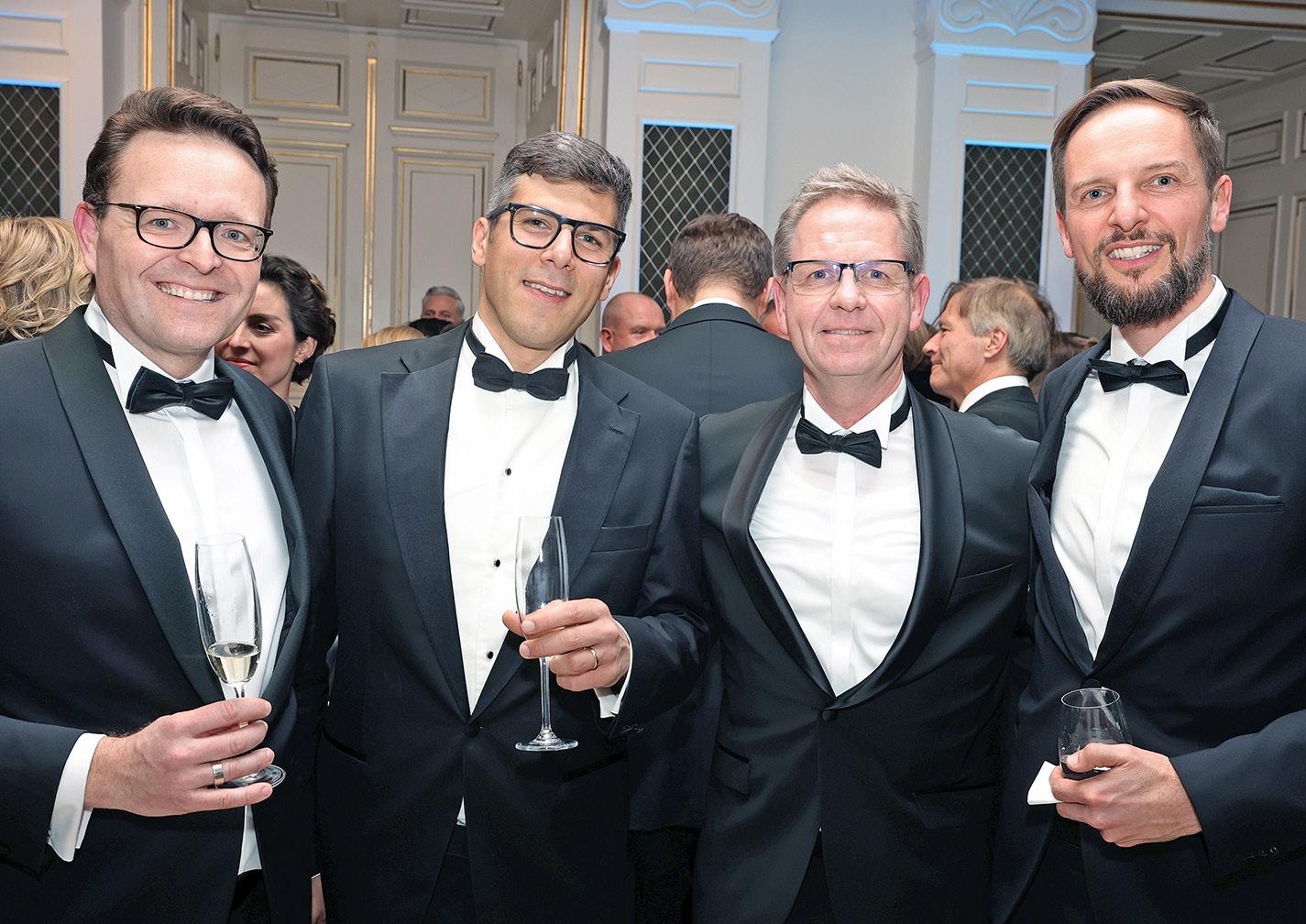
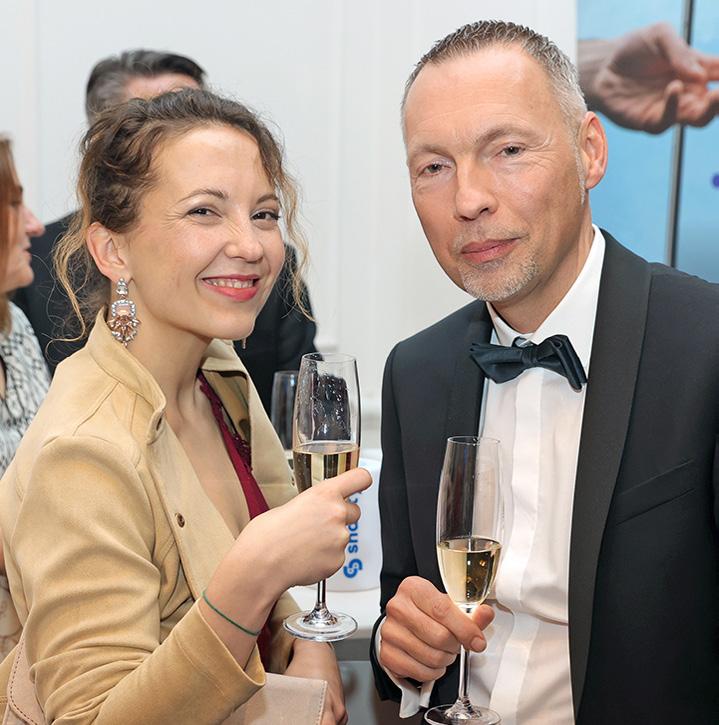


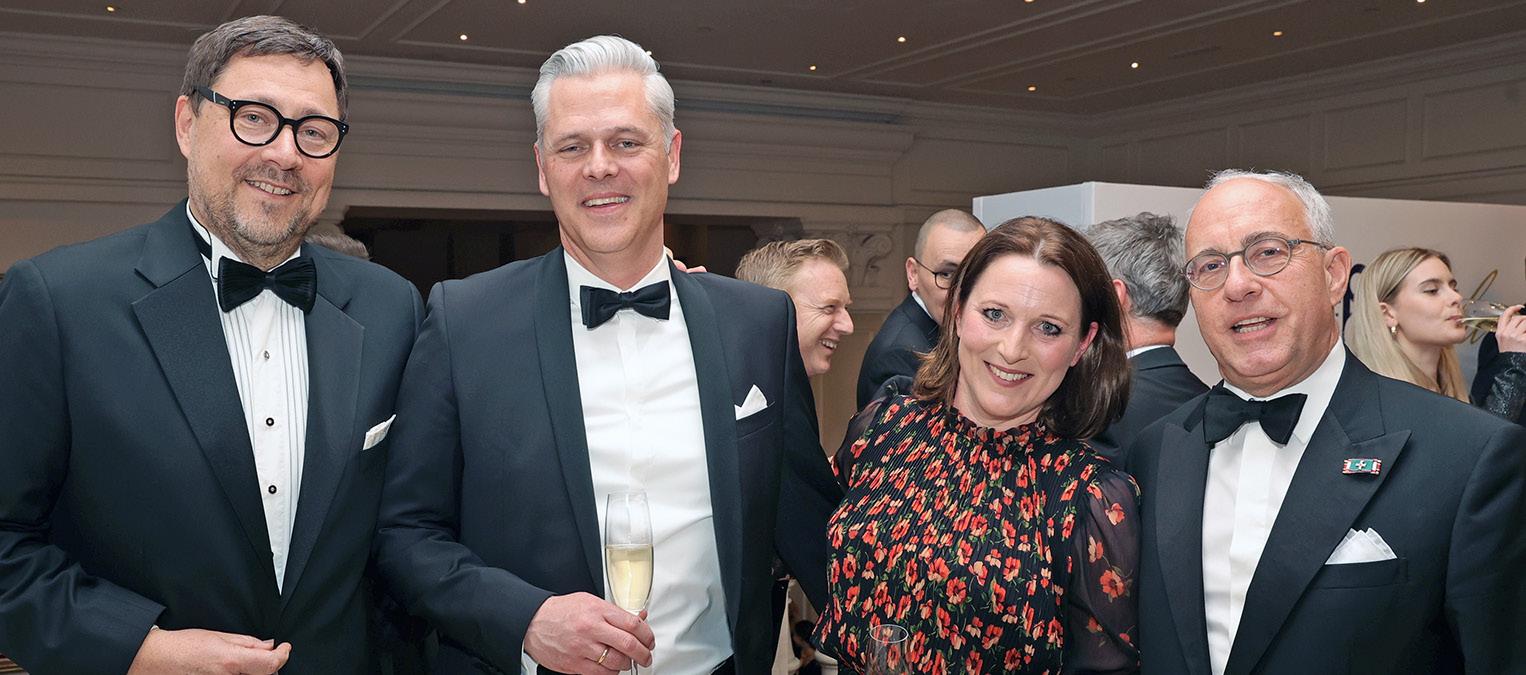

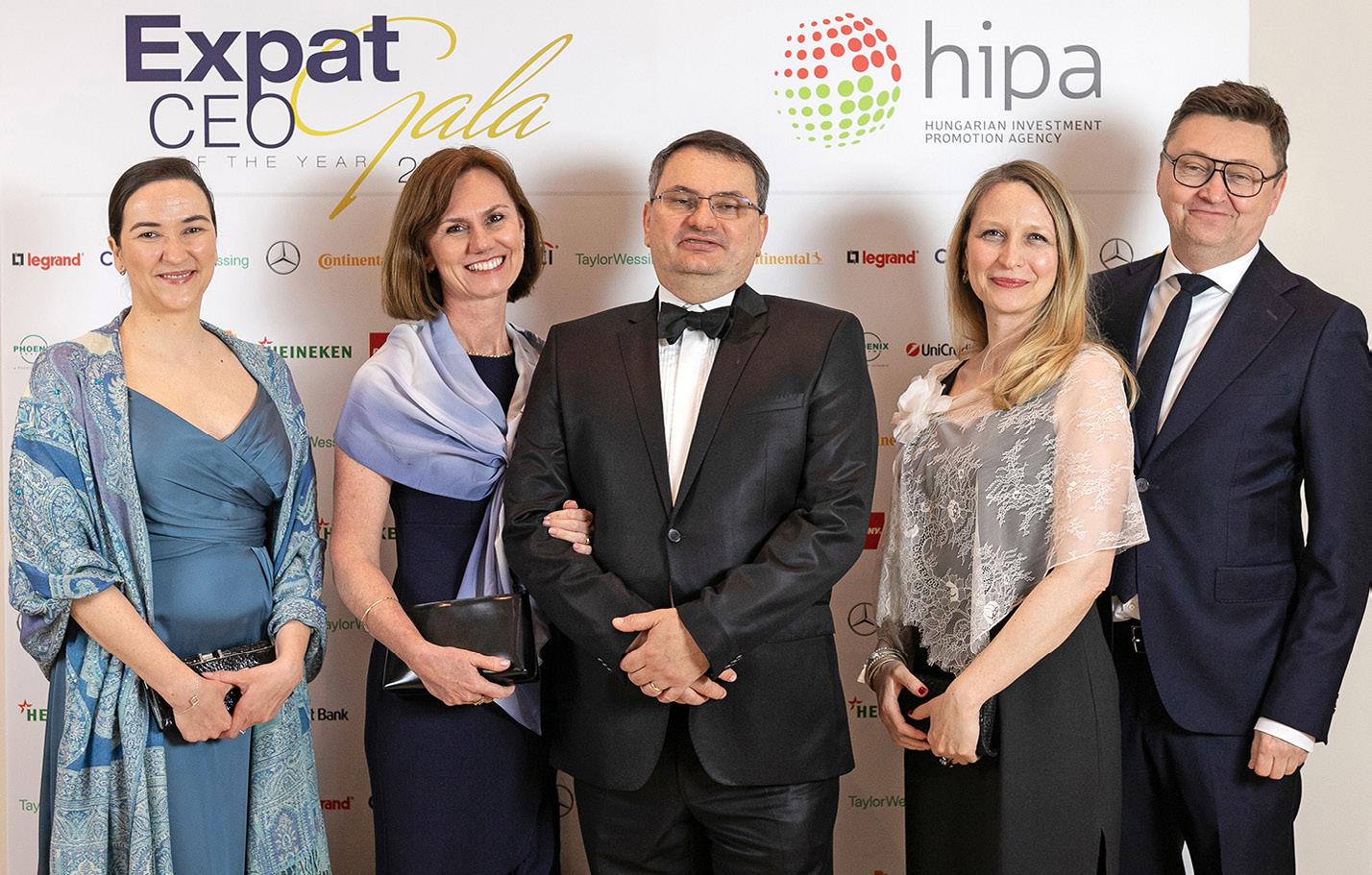


12 | 2 Business www.bbj.hu Budapest Business Journal | April 11 – April 20, 2023
Photos by Marianna Sárközy







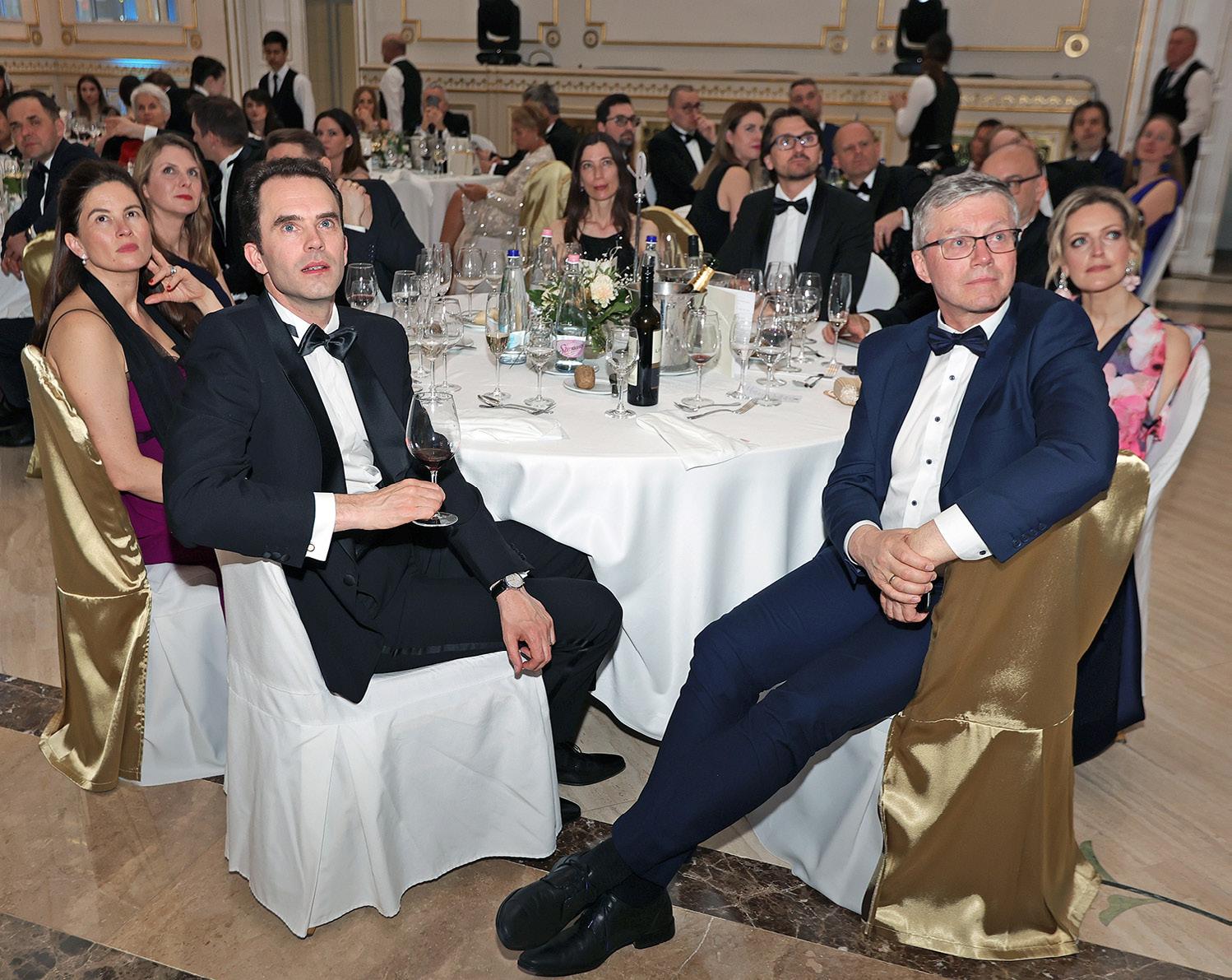



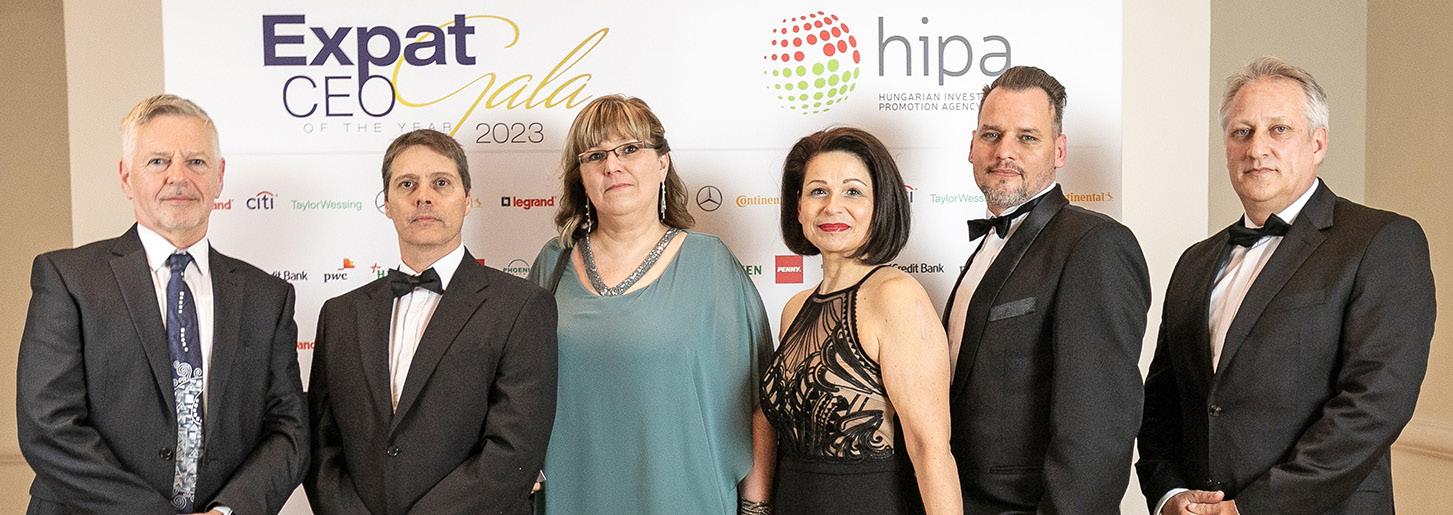
2 Business | 13 www.bbj.hu Budapest Business Journal | April 11 – April 20, 2023



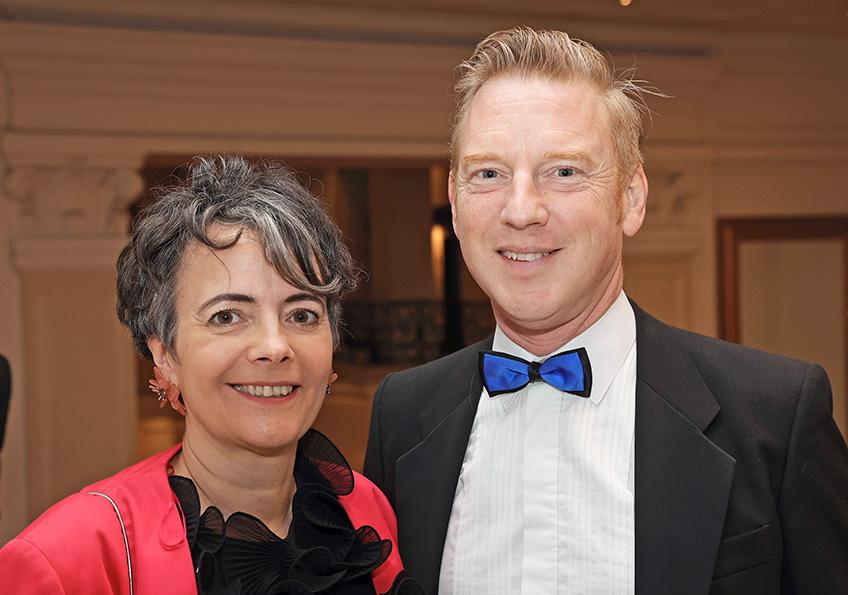


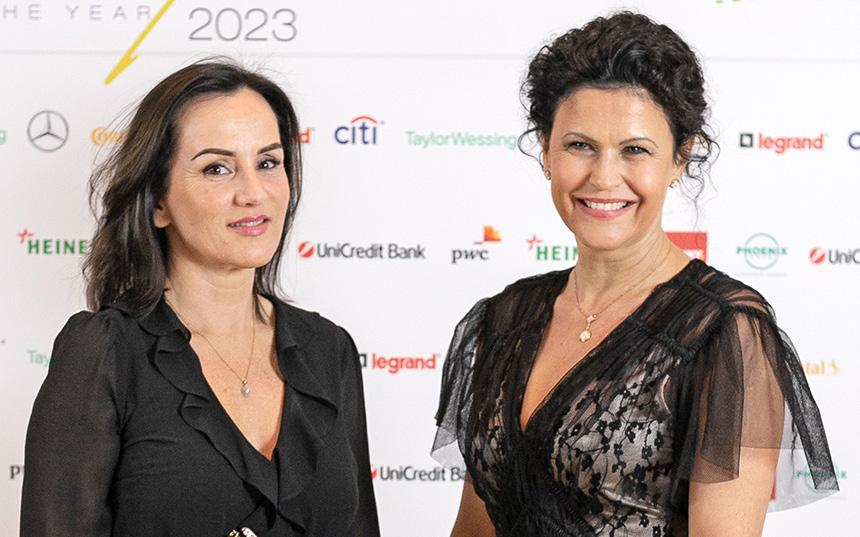
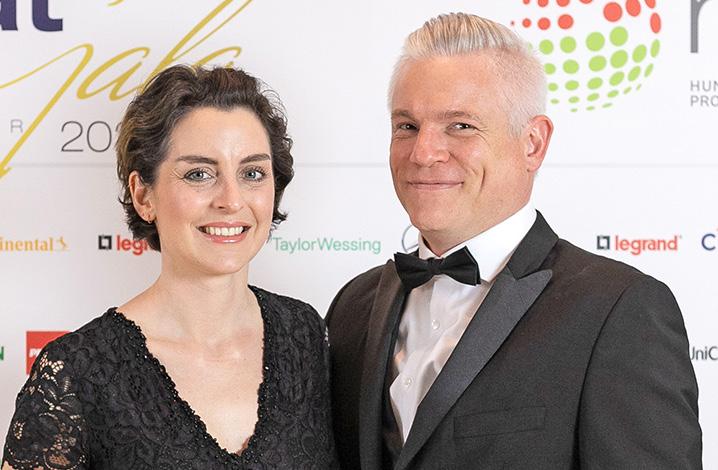
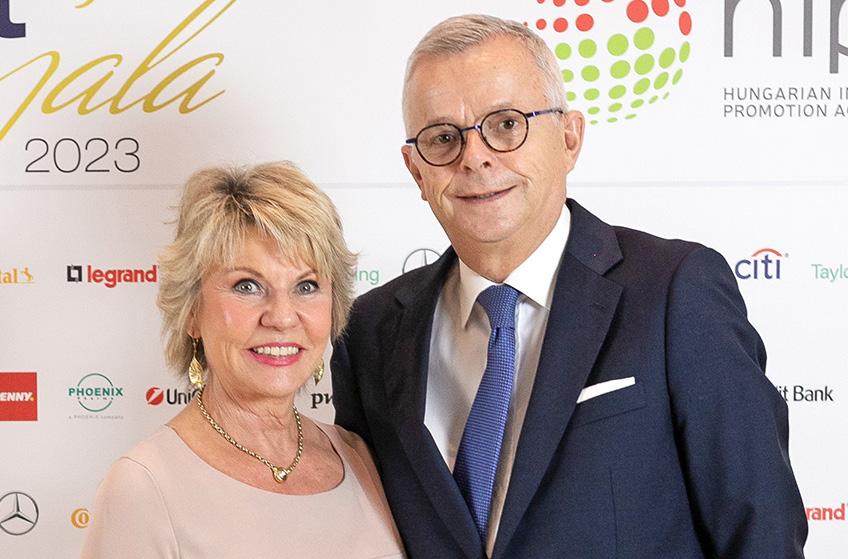





14 | 2 Business www.bbj.hu Budapest Business Journal | April 11 – April 20, 2023
3 Special Report
Healthcare
Targeting Cancer Treatment as Soon as Possible
Research by a group of clinicians from across the country led by MSD Hungary and published in late November tries to answer why so many Hungarian patients die with undiagnosed lung cancer. The Hungarian Undiagnosed Lung Cancer (Hulc) findings are surprising, but also offer a clear way forward to better outcomes, says Zoltán Polányi, the policy, market access and communications director at the pharmaceutical firm.
ROBIN MARSHALL
Hungary is routinely placed at the top of lung cancer death rates in Europe, and it also has a high percentage of the disease that is undiagnosed at death. But the MSD research noted that recent epidemiological studies have consistently reported lower figures for Hungary. How are those figures arrived at? Are we as Polányi puts it, “comparing apples and apples or apples and pears?”
First, a couple of significant clarifications are necessary. There are, on average,
1,200 undiagnosed LC patients in Hungary a year. Sometimes that may mean the tumor was not discovered until an autopsy after death. In many cases, cancer may have been detected, but there had not yet been time to perform a complex diagnosis, which is also the condition for beginning a targeted treatment.
“I would like to make a difference between ‘discovered’ and ‘diagnosed,’” Polányi explains.
“‘Diagnosed’ means that you have the biopsy, you can analyze whether it’s a mutant type, and what treatment you can give. ‘Discovered’ is something that you know is there, but you haven’t done the diagnosis yet.”
The second clarification falls into the “apples or pears” category. Hungary has a particularly good central database for anonymized research (not true of all countries, by any stretch) and may be reporting a lot more post-mortem LC for the simple fact that it conducts significantly more autopsies.
“We find these patients because there’s a very high rate of autopsy in Hungary: 35-40% of all deaths that
happen in a hospital setting in Hungary will have an autopsy; in other countries, it is 5-10%,” Polányi points out.
“Sweden, for instance, had the same level of autopsy at around 40% in the ’80s. In Hungary, the proportion of autopsy has remained high, whereas, in other countries, it has declined –significantly – since then.”
Surprise Findings
One of the things the HULC team was keen to discover was who these people were. Put another way, were there socioeconomic reasons why their cancer was undiagnosed? Were they poorer, with less education, from rural Hungary, perhaps elderly? Those factors sounded plausible, but were they actual? The team was in for a surprise.
“There is some data that suggests that there are more elderly, more who are living alone or are divorced. Those who don’t have family or children, or just a lower number of children, but it’s far from being as dominant as we anticipated at the beginning. You have undiagnosed patients in Budapest, university educated with family, kids, and a wife or husband,” Polányi says.
Although it might seem odd to suggest it, this is, in fact, excellent news.
Follow the Data
Since 2019, innovative pharmaceutical company MSD has had a department dedicated to scientific data research in Hungary. It is, Zoltán Polányi insists, “completely separate from our treatments, our product portfolio.” It focuses on the diseases with the highest mortality or incidence rate in the Hungarian population.

The worry was that these were “ghost” patients missing from the system who would be hard to trace.
“It was a pleasant surprise that these patients are in the system. They had, in the last year or two, made GP visits, they were seeing specialists: they were not invisible to healthcare. That’s a very good sign because, if we can ensure they are seen at an appropriate time, they will be able to get appropriate treatment and will have the chance to live longer,” he says.
The answer, therefore, is to improve the education around cancer, both for the general public and, more specifically, for the GPs who see patients most regularly and know the medical history. Polányi believes patients should be assessed on a level of risk, and those most in danger, smokers, obviously, but also those with a history of cancer in the family, should be prioritized for checks. With cancer, timing is everything. “Lung cancer is tricky because it doesn’t have symptoms; it can easily
“We have been researching lung cancer for four years and have had seven international publications,” he says. He acknowledges conversations with healthcare leaders asking if the research is designed to push the medicines MSD develops.
“I’m advocating for the appropriate treatment at the appropriate time. In most cases, it should be the scalpel because a cancer cut out
go unnoticed until it’s too late. It’s not like melanoma or a head or neck cancer that you can see or feel. Colorectal and lung cancer are the two that can go unnoticed until a late stage, and then it is almost always too late.”
Flip the Statistics
Typically, two-thirds of lung cancers in Hungary today are discovered too late to be treated with curative intent. At best they can be treated with the intention to make the cancer chronic. Improve the screening, and that can fall to one-third. If it can be treated in time, the chances of survival are markedly improved.
“There is data we have discovered that, if patients are diagnosed in time and have surgery, the five-year survival rate is above 60%. Whereas, if you are diagnosed in a later stage, you cannot do the surgery, and then the survival in 2016 was 8%.”
All is not doom and gloom. The figures above were for patients diagnosed between 2011 and
2016.
Research on the cohort since then is about to be revealed by Polányi’s team and submitted to a medical journal for peer review. That suggests the survival rate for late diagnosis lung cancer in Hungary has doubled since.
“But it does not change the fact that if you are diagnosed early and can have surgical intervention, your five-year survival chances are significantly higher. If you do that screening, two-thirds of the population could be identified in time for cancer to be surgically removed. This happened with breast cancer, and we have studies showing incredible improvement in melanoma survival in Hungary.”
That, Polányi says, is the point of the research. If his team can gather, analyze, get peer-reviewed, and publish the data, those that run the healthcare service, the government and the medical community, can take directed action.
in stage two will always be better than one treated with whatever “miracle product” in stage four. So, appropriate treatment at the appropriate time. The appropriate time for cancer treatment is as soon as possible. That’s the thing. And the appropriate treatment as soon as possible is the scalpel.”
National Cancer Day is observed in Hungary on April 10.
www.bbj.hu Budapest Business Journal | April 11 – April 20, 2023
PRESENTED CONTENT
Zoltán Polányi, director for market access, policy and communications at MSD Hungary.
Hungary’s Healthcare Industry Picking up Speed
Investments in pharma and medtech are badly needed in Europe to keep pace with overseas competitors and prevent a largescale brain drain. Against this backdrop, it is even more pleasing that Hungary’s healthcare industry is very much fired up, as evidenced by the data of the Hungarian Investment Promotion Agency. The latest success story features cutting-edge cancer research.
Pharmaceutical investments in the European Union are lagging compared to the United States. According to European Federation of Pharmaceutical Industries and Associations data, the investment gap grew from EUR 2 billion two decades ago to EUR 25 bln today. The balance is shifting too when it comes to access to the latest treatments: while 25 years ago, half of new treatments came from Europe, that figure has now dropped to 20%. European lobby groups have valid concerns about employment and competitiveness, not least because companies are beginning to transfer their activities away from the continent.
No wonder there is pressure on the European Commission to respond to these threats in drafting its final proposal aimed at revising the EU’s 20-year-old general pharma legislation.
It remains to be seen to what extent the commission’s proposal, due to be finalized as this article was being prepared, can address these issues. However, what is certain is that the Hungarian pharma and medtech scene is on an upward spiral.
“Between 2014-2022, 39 Hipa-guided deals were closed worth nearly EUR 1.2 bln, with American and Danish companies leading the charge in the number of new jobs,” Hipa CEO István Joó says.
The latter two investor nations accounted for more than 40% of the total investment volume and more than 60% of the new jobs. Employing some 50,000 people, the healthcare industry’s contribution to the GDP is also growing. In 2022, 2,000-plus enterprises generated some 3% of Hungary’s GDP.
Recent flagship projects include the ramping-up of pre-fillable glass syringe production by Becton Dickinson (BD) and Schott for EUR 188 million and EUR 76 mln, respectively; Samyang Biopharm’s EUR 26.2 mln development to produce synthetic suture materials and Nolato’s EUR 21 mln investment to grow its hygienic and medical product manufacturing and storage area.
Long Tradition
Hungary can pride itself on having a long academic and scientific tradition. Semmelweis and Óbuda University are both vital knowledge hubs with international reputations. A new
Hipa-guided FDI projects announced in Pharma and MedTech, 2014-2022
program for hospital and medtech engineers will start this September at Óbuda uni, unique in local higher education.
This enriches the portfolio of a university that conducts robotic surgery developments and tumor therapy research under the European Research Council and hosts Hungary’s first Faculty for the MedTech Industry.
Graduates and researchers from those prestigious higher education institutes support the background and competencies of R&D projects like the newly inaugurated Pathology Innovation Incubator that came into existence with the assistance of Hipa.
Behind the establishment are two highly successful companies, Hungary’s 3DHistech, a global pioneer in digital pathology manufacturing, and Epredia, a member of PHC Holdings Corporation (PHC Group).

As Dr. Béla Molnár, founder and CEO of 3DHistech Kft. notes, the two companies have partnered in digital slide scanning technology for pathology laboratories for several years. With the Pathology Innovation Incubator, they are seeking to build on that successful relationship and deepen their collaboration.
The mission of the Pathology Innovation Incubator is to turn scientific discoveries into innovative cancer diagnostic solutions.
“Long-term, we seek to develop methods and equipment suitable for faster and more precise diagnosis of cancer and tumor lesions,” Molnár says. “Our goal is for the Pathology Innovation Incubator to ultimately become a global scientific development center that will translate today’s scientific knowledge into clinical applications that contribute to the early and rapid cancer diagnosis.”
Cancer is the leading cause of death worldwide. According to the World Cancer Research Fund,
18.1
million cases per year are registered globally, and 10 million people die of the illness. Hungary is affected more heavily than the average: in 2021, over 30,000 deaths could be linked to cancer.
Significant Work
Epredia CEO Steven Lynum is aware of the significance of its work. The first project of Pathology Innovation Incubator, which has a budget of HUF 1.5 bln (approximately USD 4 mln), will push the boundaries of immunohistochemistry (IHC) to seek to find new solutions to complex diagnostics challenges.
That project aims to develop a highly complex combined medical technology solution for IHC tests, which are the basis of cancer diagnostics, to improve the effectiveness of personalized diagnostics and support patient treatment decisions.
“In addition to our IHC project, we are already seeing several R&D innovations in the Pathology Innovation Incubator that are bringing together cutting-edge Japanese, American and Hungarian technologies, as well as medical, biological and engineering solutions,” Lynum says.
As cancer diagnostics become increasingly complex, advancing innovative solutions can make a direct impact on society as a whole. According to Lynum, the fight against cancer must be made even more effective through better screening and early diagnosis.
“We want to develop effective and reliable diagnostic solutions to the current challenges in patient care, thereby increasing the range of options available,” he adds.
Both Epredia and 3DHistech will support the Pathology Innovation Incubator financially and through knowledge transfer and technology sharing. The investment should boost the output of sectors that are already very much export-driven. Over 86% of
the total turnover of pharma and medtech derives from exports, making up 5.2% of total Hungarian exports, the highest among the V4 countries.
“From the researcher aspect, this is not only a financial investment but also the merging of our expertise and networks with Epredia’s resources as well as know-how sharing to create a unique and world-class innovation center. This volume naturally boosts the market potential of 3DHistech and Epredia, too,” Molnár concludes.
16 | 3 Special Report www.bbj.hu Budapest Business Journal | April 11 – April 20, 2023
BBJ STAFF
PRESENTED CONTENT Country Number of projects Volume (million EUR) Number of newly created jobs USA 8 407 1 508 Germany 3 216 527 France 7 213 180 Hungary 5 88 351 UK 4 81 262 Denmark 4 71 1 631 Israel 2 34 50 South Korea 1 30 60 Japan 2 20 243 Switzerland 2 7 105 India 1 5 90 Total 39 1 172 5 007
HIPA
Source:
The inauguration of the Pathology Innovation Incubator Center in Budapest on March 23. Photo by Hipa. From left: Dr. Béla Molnár (3DHistech Kft.), Koichiro Sato (PHC Group), Masato Otaka, Japan’s ambassador to Hungary, Hungary’s Minister of Foreign Affairs and Trade Péter Szijjártó, Orsolya Ferencz, ministerial commissioner for space research and István Joó, CEO of HIPA.
The term “phygital” is a portmanteau word formed from the conflation of the words physical and digital and is being used in a growing number of fields.
Big Four consultancy Deloitte looked at what phygital patients are and how their emergence could transform healthcare in the coming years. As with any new trend, the market is expected to adapt to new consumer behavior sooner or later.
According to the study, there are several key differences between traditional and phygital patients. The latter use digital solutions in much higher proportions in the pretrial (76% vs. 58%) and post-trial (72% vs. 52%) phases than traditional patients. However, both groups preferred face-to-face contact throughout the study.
Only 39% of traditional patients trust sizeable global technology companies enough to entrust them with their medical records, compared to 60% of phygital patients. More than half of this second group would be motivated to take a more active role in managing their health by an app that combines multiple well-being and health-related functions. Phygital patients are also more likely to care about their mental health compared to traditional patients (65% vs. 41%). Unsurprisingly, phygital patients are much more likely to use phone apps to track the progress of their long-term illness (60% are open to this) compared to just 26% of traditional patients.
This already shows how the future of healthcare could be transformed by the emergence of more digital-minded patients: virtual visits could become more widespread, the role of technology companies could grow, mental health could receive more attention, and more medical apps could be on our phones.
Digitalization Benefits
According to Deloitte’s research, no other area in healthcare offers the same efficiency gains, quality improvements, safety, and economic benefits as digitalization. One significant trend in the coming years will be the spread of digitallyenabled physical solutions in healthcare, a trend that was hastened by the coronavirus pandemic.
The authors of the study believe that an important characteristic of the patient of the future will be the increasing use of new tools (phone apps, virtual doctor visits) to maintain their health. At the same time, when it comes to diagnosis, these patients will continue to behave conservatively; in other words, they will stick to face-to-face contact.
These patients could be persuaded to share their data with providers primarily through non-financial incentives and will be more concerned about their health than financial factors. For them, mental health is as important as physical health.
Deloitte surveyed patient behavior in 11
European countries, Hungary included, and compiled the study on this basis. According to the research, 49% of the population surveyed can be considered traditional patients, while 15% can already be described as phygital; the latter figure is expected to rise steadily. The new trend is prevalent among women of the millennial generation, who tend to work in medium- to large-sized companies and are afraid of chronic illnesses.
This also poses new challenges for healthcare providers, as they have to meet new demands, such as connecting with customers through different channels. In addition, there is a need for greater focus on data management and processing, as a higher proportion of phygital patients are more likely to share their health data with providers to prevent disease.
A key finding is that digital solutions may not suddenly become the main focus of future healthcare, but the existence of more channels will be much more important than it is now. Prospective patients will rely on physical contact when they have an actual complaint, but they will be more confident in using technology to prevent it.
Hungarian Results
According to Deloitte, 48% of people surveyed in Hungary can be considered traditional patients, and 13% can already be described as phygital. Interestingly, the research found no direct correlation between a country’s overall digitalization and openness to new types of healthcare services.
A monthly look at health issues in Hungary and the region
Let’s Get Phygital: Digital Patients Shaping the Future of Healthcare Health Matters
The survey also reveals some specificities about the Hungarian patient of the future. Hungarians are more price-sensitive than the European average and are mainly open to healthcare solutions at a reduced price or provided by the employer. However, Hungarians are more open to digital health management applications than the average and use them more often.
This is somewhat contradicted by the fact that there is still little awareness of these digital solutions in Hungary. The findings also note
that Hungarians are more protective of their data than the average European and less inclined to share it with service providers.
“Price sensitivity is making the population more receptive to discounts and freemium models that can help digital health management evolve,” notes Dorottya Fábián, head of Deloitte Hungary’s healthcare industry-focused team.

The survey found that Hungarians are more open to digital health solutions and more willing to use them to stay healthy or replace their previous routine. This is particularly surprising in light of the fact that, according to various international surveys, digitalization in Hungary is still lagging behind the European average, Deloitte notes. This means that even if Hungarians are open, the majority of them are not yet familiar with the most up-to-date digital solutions.
“Public health institutions have less time and energy to promote conscious health management applications. This task is left to innovative companies, and this could be a big potential for them,” says Gergely Doszpod, senior consultant in Deloitte Hungary’s technology consulting business.
The first such innovators have already appeared in this country, trying to adapt to the needs of phygital patients. One such company is DokiApp, which offers clients online consultations, digital knowledge repositories, and risk factor assessments. Merova is doing similar work, with the added advantage of being a non-profit and free to anyone. It is likely that similar solutions will become more common in Hungary in the coming years, as local consumers are clearly demanding them, Deloitte says.

3 Special Report | 17 www.bbj.hu Budapest Business Journal | April 11 – April 20, 2023
Younger generations are bringing about new trends, which are slowly spreading to all areas of life.
In healthcare, one such is the emergence of so-called “phygital patients,” who are much more comfortable using digital innovations while still clinging to physical solutions in some cases. A recent study by Deloitte looks at how healthcare might be transformed by their emergence.
BENCE GAÁL
Dorottya Fábián, head of Deloitte Hungary’s healthcare industry team.
Gergely Doszpod, senior consultant in Deloitte Hungary’s technology consulting business.
Joining the Data Dots in Personalized Healthcare
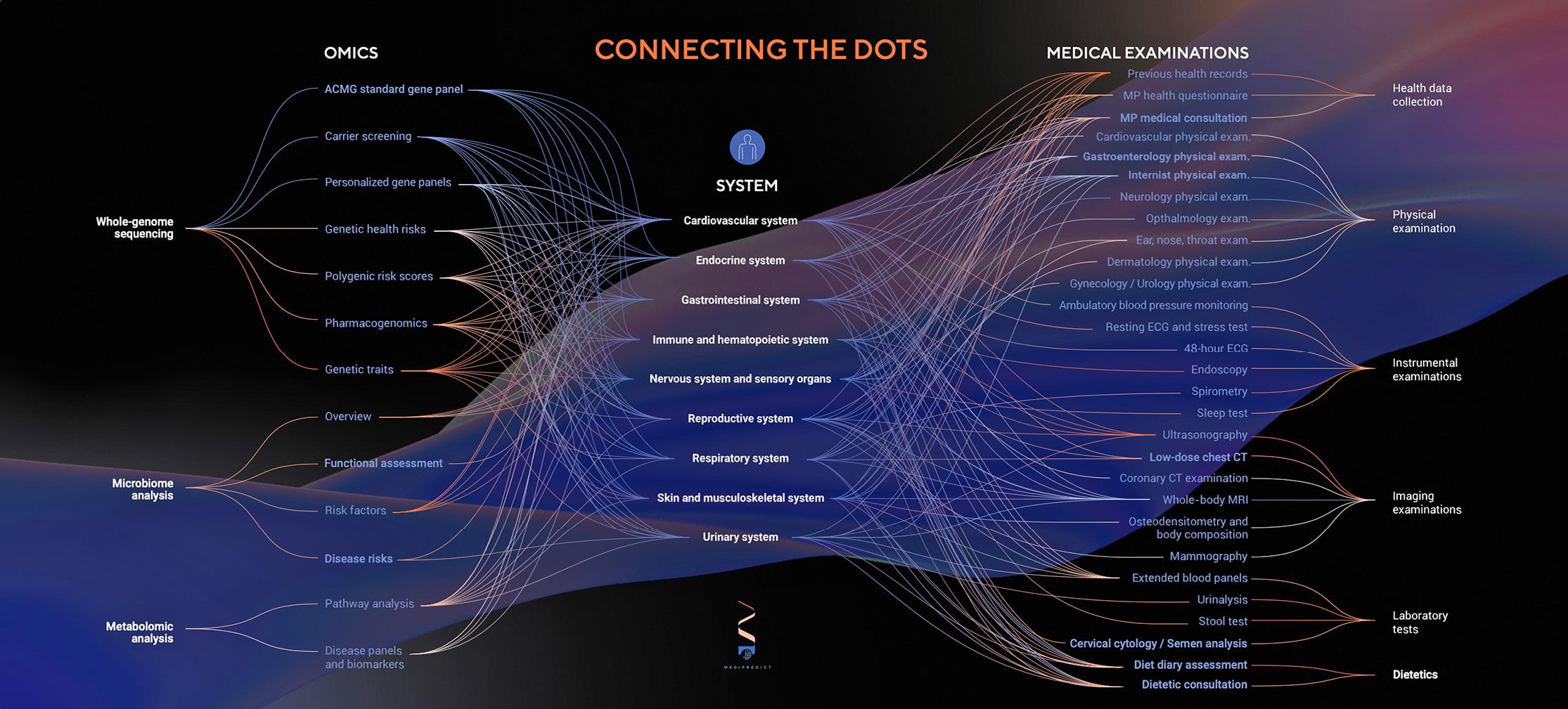
Medical director
Dr. Richárd
BBJ: When was Medipredict founded? Is it an entirely Hungarian operation? How has the company’s vision evolved, particularly in response to changes in the healthcare industry and technological advancements?
Richárd Kiss: Medipredict was founded in 2015 by Ernő Duda, an entrepreneur from Szeged and the former founder of the internationally successful Solvo Biotechnology Ltd. The company is based in Budapest, but we have an office in Szeged. Most of our colleagues are Hungarian, but we also work with foreign experts, and some colleagues live in the United States. Our company’s vision has not changed much in broad outline since its foundation, but rather the details have been refined. You could say the evolution of technology and market needs has caught up with our vision. As a result, we are one of the most experienced companies in the new market of personalized health preservation.

BBJ: What sort of services do you provide?
RK: Medipredict provides a complex health service to its clients with the aim of health maintenance. This service is orders of magnitude more complex than the wellknown manager screening. We use a wide range of medical tests, from whole-body MR scans to portable smart devices and new-generation methods such as whole genome sequencing or gut microbiome testing. We integrate the results of all these tests to identify individual disease risks and define a personalized prevention plan to address these risks. This is combined with a health coaching service, where we actively support our clients in realizing their health maintenance plan.
BBJ: Who are your primary clients and target audience? Why should somebody choose Medipredict over any of your competitors?
RK: Our potential clients are anyone who wants to maintain their health
and is willing to take active steps and make a financial sacrifice to do so. We have clients aged 18 to 85, from healthy-living obsessives through elite athletes to people who just want to ensure they have done everything that is currently scientifically possible to stay healthy. Medipredict has direct competitors only in the United States
BBJ: How does Medipredict’s technology fit into the broader context of digital health and the increasing use of technology in healthcare? What implications does this have for the future of medicine and patient care in Hungary?
RK: Medipredict brings the longheld promise of personalized medicine to the present. Advanced technologies such as nextgeneration sequencing are being brought forward from the treatment of advanced diseases to the level of prevention. We collect terabytes of data on every client in our studies. Using a digital infrastructure, we are building a flexible system so that any new data source can be integrated. According to our beliefs, these are the fundamentals of a healthcare system that is genuinely caring, really works, and focuses on health rather than on disease.
BBJ: What evidence-based research and data-driven methodologies underpin Medipredict’s technology, and how have they been validated?
integration, disease prediction, and personalized prevention, with the testing itself being carried out by our partners. Essentially, domestic private healthcare providers are Medipredict’s suppliers, who in turn, in addition to selling their medical tests, can offer their clients through Medipredict an extraordinarily complex and highly specialized service, such as wholegenome sequencing, microbiome testing, or even the current cuttingedge integrated health report.
and Canada, but these companies offer significantly more expensive services and are not as sophisticated in data integration. The key difference with these companies is that they started their development by building their medical infrastructure and buying MRI machines and sequencers. However, these tests are now readily available; the real challenge is data analysis and integration. Therefore, we perform the tests with partner institutions so that we have been able to gain a significant advantage in terms of development in recent years.
RK: Our system combines a manually curated knowledge base, various artificial intelligence algorithms, network theoretic approaches, and a decision support system. We always rely on evidence-based information with appropriate confidence in our analyses, we validate our proprietary artificial intelligence systems in our studies, and a multidisciplinary team always makes the final decisions. At Medipredict, we aim not to replace human expertise with IT tools. Instead, we focus on combining the two, which can open new horizons in health promotion.
BBJ: What is your relationship with Hungary’s public healthcare system and other private providers?
RK: Medipredict is in partnership with other actors in the private healthcare sector, as the real added value of our company lies in data
“Using a digital infrastructure, we are building a flexible system so that any new data source can be integrated. According to our beliefs, these are the fundamentals of a healthcare system that is genuinely caring, really works, and focuses on health rather than on disease.”
BBJ: You are based in Budapest. Are there plans to expand to other cities in Hungary or internationally?
RK: Clearly; from the very beginning, Medipredict was built to be able to expand and scale internationally. In Hungary, we are present in Szeged as well as in Budapest, and we will probably also be welcoming clients in other major Hungarian cities soon, such as Győr. At the international level, we will first target countries with a significant solvent demand for high-end healthcare services like ours. We are currently negotiating with partners in Switzerland, Dubai, and the Cayman Islands, so our first foreign move will probably be to one of these countries.
18 | 3 Special Report www.bbj.hu Budapest Business Journal | April 11 – April 20, 2023
BBJ STAFF
Kiss talks about the data-based approach Medipredict takes to bring ‘the long-held promise of personalized medicine to the present’ in Hungary, and perhaps soon internationally.
PRESENTED CONTENT
Richárd Kiss
Wigner Research Center, ELI-ALPS Conclude Project
The Wigner Research Center for Physics of the Loránd Eötvös Research Network (ELKH) and the ELI-ALPS laser research facility in Szeged (175 km southeast of Budapest) have completed a four-year R&D project involving particle acceleration, Wigner said on March 23, according to state news agency MTI. The research results, funded with a HUF 282 million grant from the National Research, Development and Innovation Office, could have applications in industry and healthcare.
2/3 of MOK Members Declare Intention to Remain in Chamber
More than two-thirds of doctors in Hungary, some 33,000, decided to remain members of the chamber (MOK) even though the government party majority in the parliament abolished mandatory membership in an exceptional procedure, Gyula Kincses, the president of the organization, announced in a video, according
to hvg.hu. Doctors had to indicate individually whether they wished to remain members of the chamber or whether their membership would be automatically terminated. Kincses added that the forced process, despite the government’s intention, did not weaken but instead strengthened the chamber. MOK has approximately 50,000 members, of which 42,000 are active doctors and 8,000 are inactive.
IFRC and WHO Expanding Centers in Budapest
The International Federation of the Red Cross and Red Crescent Societies (IFRC) and the World Health Organization (WHO) will expand their centers in Budapest, Minister of Foreign Affairs and Trade Péter Szijjártó said in posts from Geneva on Facebook on March 29. “The Red Cross operates a global service center in Budapest, and we agreed on its further expansion, so soon 280 people will work there,” Szijjártó said after a meeting with IFRC Under Secretary General Niamh Lawless. He noted that the Red Cross has also set up a logistics base in Debrecen (225 km east
of Budapest), knowing it can operate safely from Hungary. Szijjártó, who also met with WHO Director-General Tedros Adhanom in Geneva, said the WHO would raise the headcount at its center in the Hungarian capital from 50 to 100 in April.
GSK Rolling out Global Minimum Standard Leave
GSK began to roll out a global minimum standard of leave last October to support those with a particularly positive event, such as the birth of a child or a more challenging period when a serious illness happens with a family member who needs care and support. The benefits became available at GSK Gödöllő as of March 1, the firm has told Hungary A.M. Any colleague who has a newborn child will be able to take complementary paid parental leave in addition to their statutory leave to reach a total of 18 weeks. The complementary holiday offered by the company can be taken per week over 12 months following the child’s birth. GSK will guarantee that employees will receive their total pay and benefits during the entire leave, by supplementing the allowances received legally. GSK will also provide up to four weeks of paid caregiver leave per calendar year to care for a family member at the end of life or in a serious medical condition. GSK will ensure that employees receive their salary for the
entire leave period. “At GSK, we put the health and well-being of our employees at the heart of our efforts,” the company said in a statement. “We are aware that there will be different challenges for all of us at some point. That’s why GSK always strives to be a fair and inclusive employer by supporting its people throughout the different life stages, allowing them to thrive both inside and outside of work.”
Miskolc Hospitals
Renovated for HUF 3 bln
The capacity was expanded, and clinics were renovated in the pediatric emergency and accident care units at the Borsod-Abaúj-Zemplén County Central Hospital and László Velkey University Teaching Hospital Child Health Center in Miskolc (180 km northeast of Budapest) as part of a total investment of about HUF 3 billion, according to profitline.hu. Technical Director Sándor Breitenbach said that the development of pediatric emergency and accident care began in November 2021. The project includes developing outpatient care, renovating the burns department, and constructing a connecting corridor between the Children’s Health Center and the landing pad for the rescue helicopter. The project will continue with the renovation and expansion of the operating theaters.
New Therapeutic Approaches for Cardiovascular Disease
diseases in general, and heart failure in particular, are often connected to problems elsewhere in the body.
Hamdani’s team is currently focused on the role and mechanisms of inflammation and oxidative stress (chemical damage from air pollution, UV radiation, smoking, or alcohol consumption, among other factors), which are pivotal in the development of heart failure.
About HCEMM
The Hungarian Center of Excellence for Molecular Medicine (HCEMM) is a so-called distributed institute whose scientists develop advanced diagnostics and treatment options to support healthy aging.

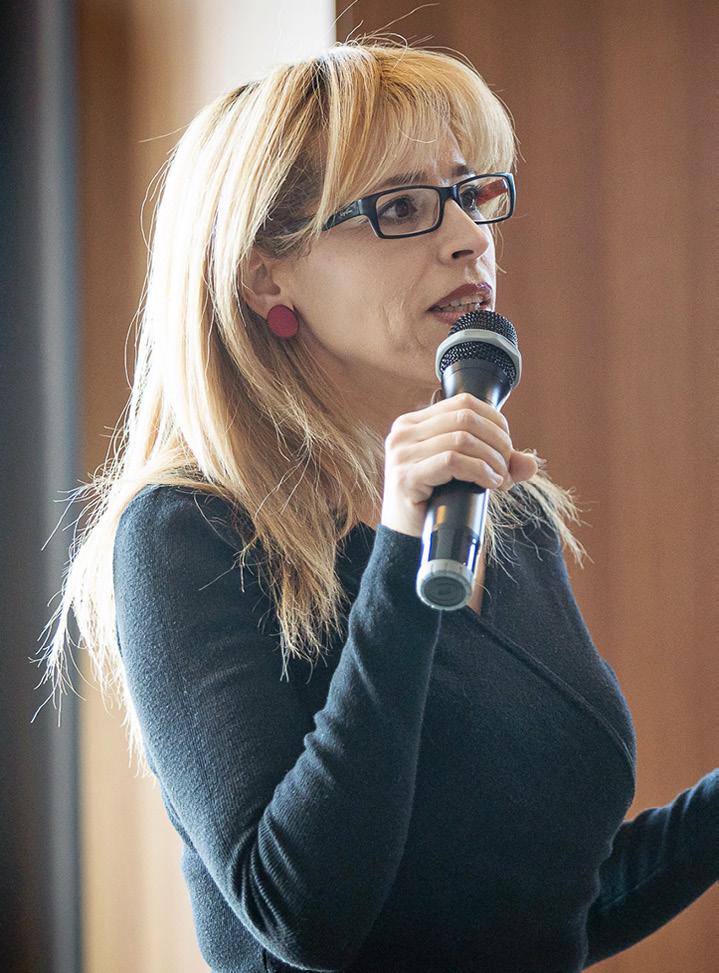
Cardiovascular disease is a leading cause of death for men, women, and people of most racial and ethnic groups in the Western world and Hungary. Not only does it shorten the lives of millions of people every year across the globe, but it also often burdens them with years spent in need of medical care.
HCEMM’s Cardiovascular Comorbidities group, under Dr. Nazha
Hamdani’s leadership, seeks to tackle the problem of heart failure, a type of cardiovascular disease in which the heart fails to pump blood properly around the body and that hospitalizes more people in the Western world than any other condition.
As the cardiovascular system is directly involved with every organ, it is not surprising that its
These conditions disrupt the communication between the small blood vessels which support the heart, the heart muscles, and the cells that maintain the structural framework of the heart. The result of this disrupted communication in some heart conditions is a stiffening of the heart muscle, which means the heart has to work harder to keep pumping the same amount of blood. This, eventually, leads to symptoms like shortness of breath or fatigue, which impact the quality of life even before heart failure becomes acutely life-threatening.
By better understanding this condition and how factors like age, sex, and comorbid conditions influence the development of the disease, Hamdani’s team aims to identify new therapeutic approaches that could not only be used to save lives but to make life more livable for many people affected with heart conditions.
Currently, the HCEMM Program is funded by an H2020 Teaming Grant, where Semmelweis University, the University of Szeged, and the Biological Research Center in Szeged cooperate with their advanced partner, the intergovernmental European Molecular Biology Laboratory (EMBL, with headquarters in Heidelberg), a Thematic Excellence award, as well as a National Laboratory award from the Hungarian government via the National Research, Developments and Innovation Office.
The coordination of the various activities is managed by HCEMM Kft., with headquarters in Szeged. HCEMM works at the interface of academic and industrial research on translational medicine, a “bench-tobedside” approach for developing new treatments. The goal is to improve the quality of life for an aging Hungarian population while at the same time lowering the cost of healthcare provision through novel applications in the field of molecular medicine.
3 Special Report | 19 www.bbj.hu Budapest Business Journal | April 11 – April 20, 2023
BBJ STAFF PRESENTED CONTENT
Researchers at the cutting-edge Szegedbased Hungarian Center of Excellence for Molecular Medicine (HCEMM) are taking on one of the biggest killers in the world today: heart failure.
in Brief News Healthcare
Dr. Nazha Hamdani
11 emineo magÁnkóRHÁz www.emineo.hu
2,467 (2021) Emineo Kft.
Orthopaedics, traumatology, anaesthesiology, internal medicine, diabetology, ear, nose and throat, cardiology, neurology, neurophysiology, urology, radiology, rheumatology, dermatology, surgery
Screening, weight clinic, research and development, health insurance advice, physiotherapy, manual therapy, physiotherapy
2009 56
Zsolt Knoll, Kálmán Fábián, Veronika BörzseiKnoll (100) –
veronika börzsei-knoll, zsolt knoll ––
1117 Budapest, Nádorliget utca 8. (1) 773-3333 emineo@emineo.hu
12 PozitRondiagnosztika kFt. www.pet.hu
2,460 PozitronDiagnosztika Kft.
PET/CT, CT, MR, Cardio-CT, mammography, ultrasound, endocrinology, cardiology, psychiatry, gastroenterology, vascular surgery, proctology, diabetology, laboratory tests, aspiration cytology
Isotope production and trade 2004 70 (100) –
andrás kókay Gábor Gombos Alma Arató
1117 Budapest, Hunyadi János út 9–11. (1) 505-8888 info@pet.hu
13 k-med kFt. www.sasszemklinika.hu
1,665 (2021) K-Med Kft. Occupational health – 1999 34 Varga és Társa Befektetési Kft. (100) –
botond Halmai ––
1118 Budapest, Ménesi út 57. (1) 250-5505 info@ sasszemklinika.hu 14 RmC CliniCs www.rmc.hu
Complex outpatient care with 60 specialties, Fetal Medicine Centre, Paediatric Center, Dental Center, Day Surgery Center, Bladder Pain Syndrome Center
Complex health promotion screening packages, maternity and baby-mum services, menopause programme, Covid screenings and post-coronavirus screening, International Vaccination Center
2001
Individuals (19) MedLife SA (81) györgy leitner Miklós Barta Kinga Tihanyi
15 FoCus mediCal lézeRes lÁtÁsJavító közPont www.focusmed.hu 1,260 Focus Medical Egészségügyi Szolgáltató Kft. Laser vision correction, cataract surgery – 1990 13 K–Med Kft. (100) –
istván Ferincz ––
1026 Budapest, Gábor Áron utca 74–78. (1) 392-0505 info@rmc.hu
1007 Budapest, Margitsziget, Ensana Thermal Hotel (1) 450-3333 info@focusmed.hu
16 FiRstmed www.firstmedcenters.com
1,208 FirstMed-FMC Kft.
General practitioner, internal medicine, paediatrics, specialists: gynaecology, orthopaedics, cardiology, ophthalmology, gastroenterology, ear, nose and throat, pulmonology, physiotherapy, urology psychology, psychiatry, surgery, neurology
Radiology: X-ray, ultrasound, laboratory 2011 55 (9) (91)
dennis diokno Andrea Vízvári –
1015 Budapest, Hattyú utca 14. (1) 224-9090 info@ firstmedcenters.com
17 istenHegyi magÁnklinika www.ihklinika.hu 1,097 Istenhegyi Magánklinika Zrt.
Dermatology, endocrinology, diabetology, vascular surgery, ear, nose and throat, gastroenterology, immunology, cardiology, gynaecology, surgery, urology
Day surgery, outpatient specialist care, aspiration cytology, refrigerated prostate, thermotherapy, menopause clinic, fat grafting treatment
1994 19
Rudas Holding Kft. (75), Mihály Kollár (25)
lászló Rudas, mihály kollár Gábor Szlaukó –
1125 Budapest, Istenhegyi út 29–31. (1) 224-5424 info@ihklinika.hu
20 medoC egészségközPont www.medocklinika.hu
288 Medoc Egészségközpont Zrt.
NR gÁsPÁR mediCal CenteR www.gasparmed.hu A
Gáspár Medical Center Egészségügyi Szolgáltató Kft.
NR kelen kóRHÁz www.kelen.hu A Kelen Kórház Kft.
Gastroenterology, paediatric gastroenterology, proctology, internal medicine, endocrinology, diabetology, neurology, psychiatry, dermatology, rheumatology Psychology 1990
Allergology, internal medicine, dermatology, diabetology, endocrinology, vascular surgery, physiotherapy, occupational health, dentistry, orthodontics, ENT, gastroenterology, physiotherapy, cardiology, laboratory, gynaecology, neurology, orthopaedics, rheumatology, ophthalmology, urology, ultrasound
Allergology, angiology, internal medicine, dermatology and paediatrics, diabetology, dietetics, breast diagnostics, endocrinology, vascular surgery, occupational health, ENT, gastroenterology, paediatric cardiology, paediatric orthopaedics, immunology, cardiology, neurology, gynaecology, pulmonology, radiology, rheumatology, surgery, ophthalmology, urology, lymphoedema outpatient clinic
12
Edit Kelemen (50), András László (50) –
andrás lászló ––
1037 Budapest, Bécsi út 85. (70) 311-1615 info@ professionalrendelo.hu 19
– 2008 16
Kornél Sándor, Katalin Éva Bohn (100) –
katalin brigitta Putz ––
1042 Budapest, Árpád út 47. (20) 554-1498 recepcio@ springdaymedical.hu
Incontinence treatment, shock wave therapy, laboratory services 2008 36 Andrea Szegedi (100) –
Allergology, ENT, dermatology, soft laser therapy, plastic surgery, vascular surgery, gynaecology, urology – 2022 13
Internal medicine, surgery, gynaecology, urology, paediatric surgery, ear, nose and throat, ophthalmology, neurology, orthopaedics, laboratory, rtg, uh, cardiology, pulmonary medicine, occupational health
Lajos Gáspár (100) –
One day surgery 1999 35 (100) –
Ádám bálint Tamás Módos Sándor Forgács
1134 Budapest, Lőportár utca 20. (1) 783-6004 info@ medocklinika.hu
lajos gáspár ––
zsuzsanna kövesd ––
1085 Budapest, József körút 37–39. (1) 317-8175 info@gasparmed.hu
1119 Budapest, Than Károly utca 20. (1) 205-0205 kelen@kelen.hu
3 Special Report | 21 www.bbj.hu Budapest Business Journal | April 11 – April 20, 2023 A = would not disclose, NR = not ranked, NA = not appliacable This list was compiled from responses to questionnaires received by April 5, 2023, and publicly available data. To the best of the Budapest Business Journal’s knowledge, the information is accurate as of press time. The list is based on companies’ voluntary data submissions. While every effort is made to ensure accuracy and thoroughness, omissions and typographical errors may occur. Additions or corrections to the list should be sent on letterhead to the research department, Budapest Business Journal, 1075 Budapest, Madách Imre út 13–14, or faxed to (1) 398-0345. The research department can be contacted at research@bbj.hu Rank ComPany Website t otal net R evenue in 2022 (H u F mln) name oF oPeRating ComPany aReas oF sPeCiality otHeR seRviCes y ea R establis H ed n o. o F F ull-time em P loyees on m a RCH 1, 2023 oWneRsHiP (%) HungaRian nonHungaRian toP loCal exeCutive CFo maRketing diReCtoR addRess PHone email
1,604
RMC MedLife Holding Kft.
47
–
PRoFessional oRvosi
18
kFt. www.professionalrendelo.hu 381 Professional Orvosi Kft.
oxygen mediCal kFt. www.springdaymedical.hu
310 Oxygen Medical Kft.
4 Socialite
U.S. Jazz Singer-songwriter Lizz Wright on the Power of Music

When she kicks off Jazzfest Budapest 2023, Lizz Wright will be setting an impressively high standard of musical excellence. In advance of the festival, I sat down to talk to Wright about her music, Budapest, how where she’s performing shapes her music, and jazz today.
Gracious, warm, and thoughtful in her answers to questions, Wright laughs, or rather chuckles, a lot. One of three children born to a minister and a church musical director in Georgia, Wright started young, singing gospel and playing piano in church. Jazz and blues also figured prominently in her musical education.
In 2000, she joined the vocal quartet In the Spirit. She signed to the illustrious jazz label Verve Records in 2002. She’s now seven albums into her career, with another one on the way.
Listening to Wright’s music and her rich voice, I hear smoky old-school and rhythm and blues alongside the jazz, gospel and folk.
“I’m happy that you hear all these,” she tells me. “In life, it’s impossible to divide the experiences that lead to sounds, especially as a black American. It makes sense to me that you hear all these things, and yet, when you have to sell music, it’s only then that you’ve got to be neat and tidy with your labels.”
Wright also has the ability to make covers such as the Bee Gees classic “To Love Somebody” or Ella Fitzgerald’s “The Nearness Of You” entirely her own. So much so that it’s often hard to know whether she’s singing a standard or one of her own songs.
“That’s a big compliment to me,” she says, smiling. “Because I feel the way to become a solid writer is to pay attention to how others have learned
to speak. Covering songs is just a great way to study. I’m glad you can’t tell without looking. That’s super exciting to me.”
Third Time a Charm
Wright thinks this is the third time she’s played in Budapest.
“The people are surprising because they sit so politely,” she says. “They seem shy at first. But after a few songs, when I’m just digging in to the gospel blues thing, I see them recognizing something all hardworking people have in common: this prayer, this yearning, that’s universal. By the end of the show, I feel much more connected to people, in tune with them.”
Being in tune with her audience is vitally important to Wright. Her last album, the terrific “Holding Space” (2022), recorded live in Berlin, is named for a term that originated in contemporary spirituality.
According to the website Shondaland, “Holding Space” is about being empathic
to other people and making time to receive what they feel the need to communicate in a supportive, non-judgmental way. It’s about allowing people the opportunity to be fully seen and heard.
The album, which includes a swampy, extended reworking of Neil Young’s classic “Old Man” with a powerful guitar solo, was, Wright explains, “spawned from the experience of realizing the role an audience plays in inspiring the sound I and my band make, and our feelings.”
For Wright, this realization comes about because of absence. “In this case, it’s about the people,” she says. “There’s this cavity in us when we remember how deeply we’ve communed, loved and grieved. It was humbling and exciting to understand that I felt that way about the audience.”
Given that “Holding Space” was recorded in Berlin and Wright is about to play in Budapest, does she change her set for European audiences?
“I’ve never been asked that before,” she says. “I have a list of songs that I’ll send to my bandmates before a tour. But I do leave myself some space to react to people and environments. In Europe, I generally find that I’m able to get away with extremely tiny, intimate songs and a very intimate delivery, but it really depends on the venue, how the space is designed and people’s energy. In the end, I’m an initiator, not an entertainer.”
A Lot of Trust
Working with a band that insists on planning and clarity from Wright but possesses “a certain freedom and authority in their position” is also important. “It took years to develop those relationships, so there’s a lot of trust there.”
“In Europe, I generally find that I’m able to get away with extremely tiny, intimate songs and a very intimate delivery, but it really depends on the venue, how the space is designed and people’s energy. In the end, I’m an initiator, not an entertainer.”
When I spoke to Jazzfest Budapest organizer Attila Kleb, he was pessimistic about the state of jazz in this country, saying, “the whole genre is completely marginalized in Hungary. Only members of a small subculture go to the concerts. Jazz gets no coverage in the media and, sadly, cultural policy acts as if it doesn’t exist. And we still produce outstanding musicians.”
Is the state of jazz important to Wright?
“It’s very important. Jazz, in its nature, is of the time. It’s about how people are speaking about their lives and to one another. It’s the stone in the river and the flowing water itself, which is formless,” she explains.
“Some people are more drawn to the aspect of the river stones that give the music its structure, make it move a certain way. Others are more about what is always now, in the nuance of this moment, calling us to respond to what’s happening in the present. While I love the function jazz has played in history, I trust to be discerning and non-judgmental because jazz has to be ongoing.”
Ultimately, Wright has faith in jazz.
“I thank life for this music, this untouchable place we can’t ruin even if we try,” she says, laughing. “It reminds me of how vast and abundant life is.”
You can buy tickets for Lizz Wright’s concert via jazzfestbudapest.hu. “Holding Space,” her latest album, is available on major streaming platforms.
www.bbj.hu Budapest Business Journal | April 11 – April 20, 2023
DAVID HOLZER
Lizz Wright. Photo by Jesse Kitt.
Chamber of Commerce Corner
This regular section of the Budapest Business Journal features news and events from the various international business chambers. For further information and to register for events, visit the website of the organizing chamber. If you have information for inclusion on this page, send an email in English to Annamária Bálint at annamaria.balint@bbj.hu
French-Hungarian Chamber of Commerce and Industry (CCIFH)

Free Zoom Webinar:
Tour CEE in 45 Minutes
A regular English-language series of economic trends and news presented by the experts of the six Franco-bilateral chambers from Central and Eastern Europe (Czech Republic, Hungary, Poland, Romania, Serbia, and Slovakia). The special guest this time will be Diana Karachanski, associate economist at Coface, and the central topic inflation.
• When: April 25, noon. • Cost: Free, but prior registration required.
CCIFH New Members Welcome
Cocktail Reception
• When: Tuesday April 18, 6 p.m.
• Where: Hotel Nemzeti Budapest –Mgallery, József körút 4, 1088 Budapest • Cost: Members, HUF 15,900 HUF + VAT; non-members, HUF 23,900 HUF + VAT.
Swiss-Hungarian Chamber of Commerce (Swisscham)
The NetherlandsHungarian Chamber of Commerce (Dutcham)
Dutcham will host what it promises will be “an elegant, yet casual” gala dinner on May 11 from 7 p.m. at the Budapest Marriott Hotel. More details will follow. It will also host a “Grow Together” event on May 30 at ING Bank. Called the Inclusive Company which aims to sustain dialogue and share best practices to answer timely Diversity, Equity and Inclusion (DEI) questions.
Canadian Chamber of Commerce in Hungary (CCCH)
Swisscham Hungary held its first sponsor meeting of the year at the residence of the Swiss Ambassador Jean-François Paroz. Their guest this time was István Joó, the CEO of the Hungarian Investment Promotion Agency. Hipa is an important partner for both the chamber and its companies, with countless joint projects realized. The VIP Lunch event provides an opportunity for supporting members to discuss current matters with each other and the invited guests.
Art & Business Club: Contemporary art as an Investment
György Gajzágó, director of the Academy of Contemporary Art Collectors (CCA), will give the presentation “Contemporary Art Objects as an Investment,” which forms the focus of the event.
The next CCCH Business Breakfast session will be on Intelligent Energy Services. Many companies are currently facing challenges with sudden spikes and high volatility in energy costs due to hasty transitions towards green energy and geopolitical impacts. In this turbulent economic environment, how can innovative “Intelligent Energy Services” solutions help control and predict energy costs?
• When: April 12, 3 p.m.
• Where: Online Zoom meeting (access data will be sent before the event) • Cost: Free for members; HUF 5,000 HUF / person (0% VAT) for non-members.
German Hungarian Chamber of Commerce and Industry (DUIHK)
“from home.” More Hungarian companies are also successfully engaging in vocational education. State Secretary for Education Balázs Hankó emphasized the close interaction between higher education, vocational education and adult education on the one hand, and the economy and the labor market on the other.
Women@duihk Visit to Penny Logistics Center
While a few years ago, optimizing energy usage was only a part of a company’s medium to long-term strategy due to low and predictable energy prices, today, extremely high energy costs can significantly impact profits, eroding ROI for energyrelated investments. What IT solutions can assist in implementing energy cost-saving measures quickly and cost-effectively while maintaining an optimal investment level?
The presentation will be held by Zsolt Hoffmann (CEO/BMD, Smart Digital) and Gábor Bényász (CEO/ CTO, EKT Solutions Kft.).
• When: April 20 from 8:30 a.m.
Vocational Training Award: Good for Youth, Good for the Economy
The DUIHK has awarded its Vocational Education Award for the 10th time. It launched the award a decade ago to strengthen the social appreciation of vocational education and thus to support member companies in securing the next generation of skilled workers. Since then, more than 310 projects have been submitted for the competition, a record of 51 this year alone.

A special feature of the award is that it is not restricted to DUIHK members; any institution in Hungary that practices and promotes vocational education can apply. This year, the jury nominated 16 projects from the 51 submitted for the final round. The prizes finally went to the Miskolc Vocational Training Center (in the Motivation category), MOL Petrolkémia Zrt. in Tiszaújváros (Cooperation), and Festo-AM Kft. from Budapest
(Innovation). The jury awarded a special prize to Praktiker Kft. for a novel career orientation project.
The seven-member jury consists of independent experts, including representatives from vocational schools, the Hungarian Chamber of Industry and Commerce, the Ministry of Culture and Innovation, a specialist journalist and the head of the GermanHungarian Education Center.
The speeches and panel discussions at the Vocational Education Day focused on the fact that high-quality vocational education is not only necessary for young people at the start of their careers, companies and society as a whole, but also pays off in the long term.
DUIHK vice president Achim Weinstock stated that it is not only German companies which are setting up and running their own training structures in Hungary based on well working models
An event organized by women@ duihk will focus on the retail logistics sector and the work of women within it. Participants will be shown around the central warehouse. In a panel discussion, female employees at Penny will give further insights into the logistics sector. This is a Hungarian and German language event, with simultaneous translation.
• When: April 19, 8:30 a.m.
• Where: Penny logistics center, Alsónémedi • Cost: Free
Exchange of Experiences: Personnel managers and HR Staff
A Hungarian language event will feature an exchange of experiences between HR managers and staff on how to sustainably ensure a welltrained and satisfied workforce. With experts from Festo-AM Kft.
• Where: CIB Bank, Petrezselyem utca 2-8, Budapest 1024. • Cost: members, HUF 11,900 (incl. VAT); non-members, HUF 20,900 (incl. VAT). Coffee & breakfast and business networking is included. Register now to participate at events@ccch.hu or +36(30)993 9789 or www.ccch.hu/events/
American Chamber of Commerce in Hungary (AmCham)
Highlights of AmCham’s April calendar
On the occasion of the capital’s 150th anniversary, AmCham will host Budapest Mayor Gergely Karácsony at a Business Forum to discuss his priorities and goals, as well as new and recent developments ahead of the city. The Business Forum organized on April 18 will take place at Kempinski Hotel.
• When: April 20, 2 p.m.
• Where: DUIHK office • Cost: Free, for members only.
AmCham is also preparing a more informal, but very informative, five-part interactive HR Masterclass between April 13 and May 11 focusing on a people-first approach and how it can contribute to building a thriving workplace culture as well as efficiently motivating and retaining talented workforce.
4 Socialite | 23 www.bbj.hu Budapest Business Journal | April 11 – April 20, 2023
Photo by Csanád Kiss
/ DUIHIK
I





















































have a lot to pass on. And someone to pass it on to.












 Robin Marshall Editor-in-chief
Robin Marshall Editor-in-chief















































































































